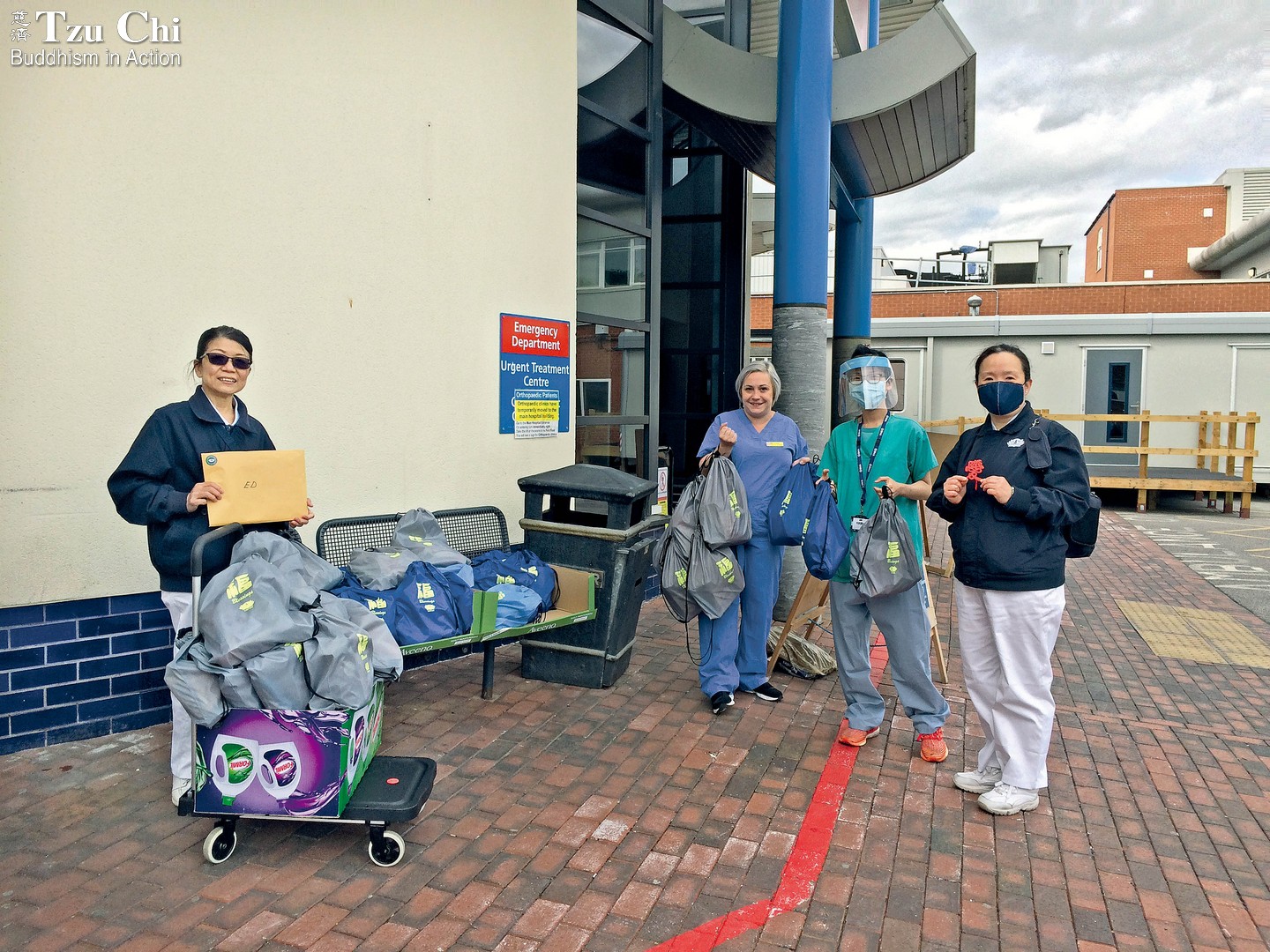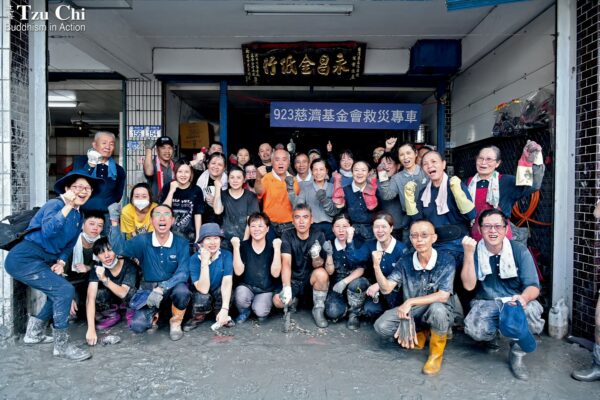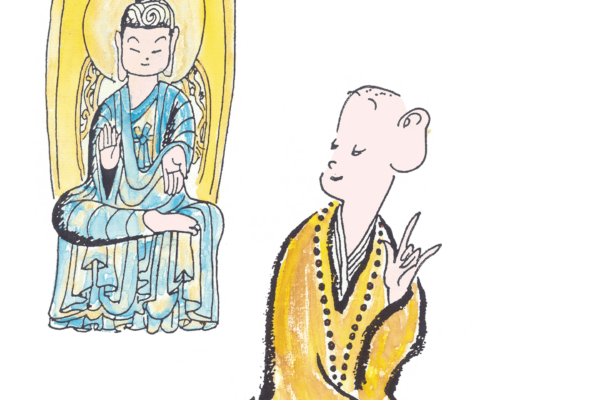By Ye Zi-hao
Edited and translated by Wu Hsiao-ting
No corner of the world has escaped the fallout from COVID-19. As a result, the scope of aid provided by Tzu Chi in response has been unprecedented for the foundation, spanning countries across five continents. In addition to donating personal protective equipment, Tzu Chi has provided food and daily necessities to the needy to help them weather the financial hardship wrought by the crisis. Despite the unprecedented global crises and the countless challenges the pandemic has produced, one thing is certain: love has endured.
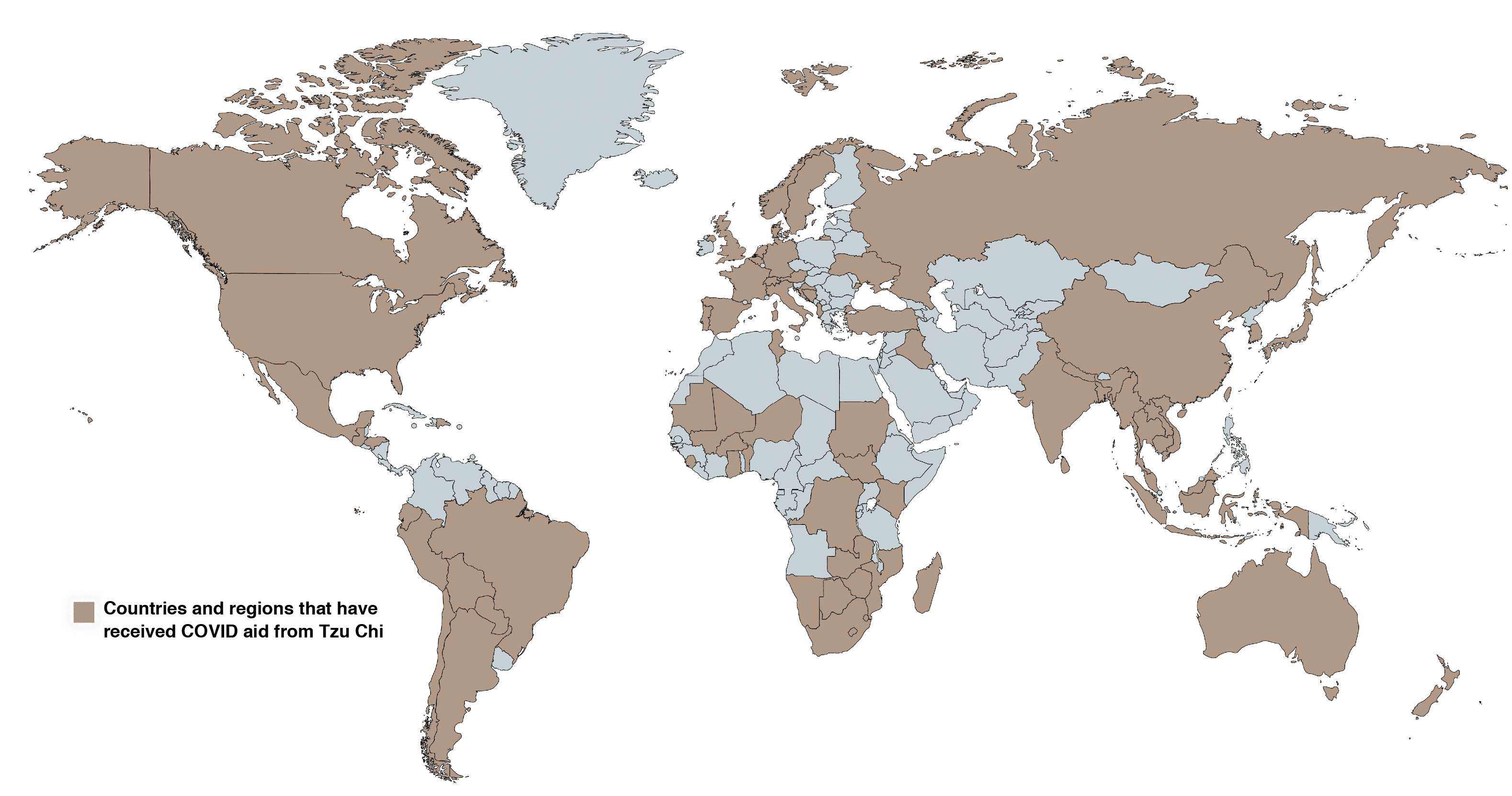
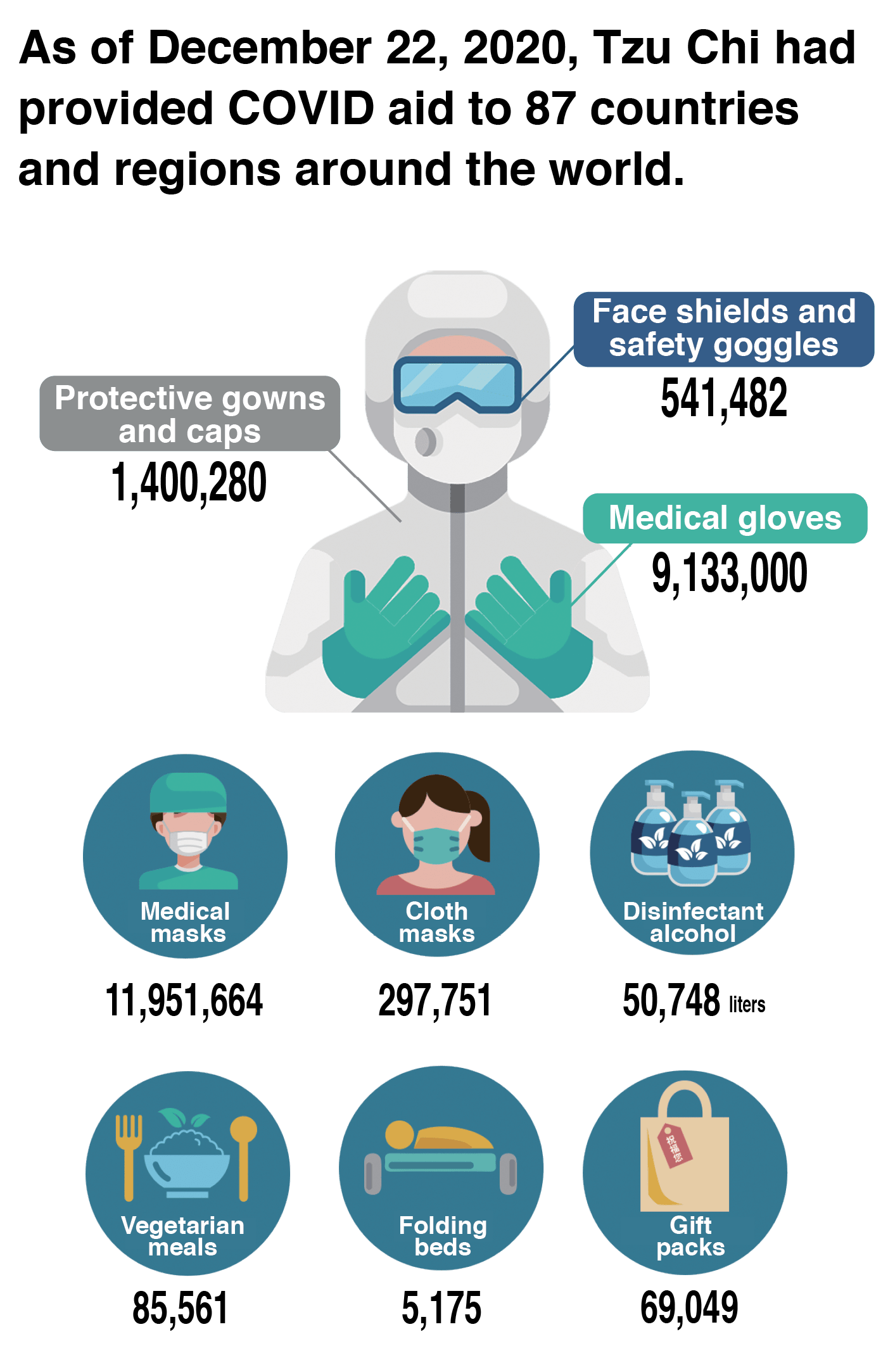
COVID-19 has ravaged countries the world over. The death toll as of mid-December 2020 stood at a staggering 1.6 million. Fifteen countries by the same time had registered over a million cases, include the United States, India, Brazil, Russia, and France. Infections and deaths aside, the coronavirus has devastated economies around the globe. No nation has been left untouched by the pandemic and its fallout.
The Tzu Chi Foundation has been involved from the very beginning of the pandemic, bringing help to those impacted. On January 26, 2020, when most people in Taiwan were still celebrating Chinese New Year, an anti-coronavirus team was formed at Tzu Chi headquarters in Hualien, eastern Taiwan. Foundation personnel and volunteers in Taiwan and abroad began coordinating and organizing the purchase of personal protective equipment (PPE) to send to areas with outbreaks. As the infection spread beyond China and lockdowns and other measures were implemented by countries to contain the virus, volunteers in many nations launched relief programs to help people financially hurt by the outbreak. The foundation also launched a global daily prayer event to pray for blessings for the world. They called upon people to adopt a vegetarian diet as a show of sincere piety and to help dispel disasters.
Tzu Chi’s COVID aid reached more than 85 countries, spread across the five continents of Asia, Oceania, the Americas, Africa, and Europe. A relief project of this scale would not have been possible without the work and cooperation of many people, especially as lockdowns and movement restrictions made everything more difficult to carry out. Despite the difficulties, volunteers stayed the course, enabling the love of Tzu Chi donors to reach many vulnerable populations around the world. Tzu Chi’s efforts to help people make it through the pandemic have continued into 2021 as well.
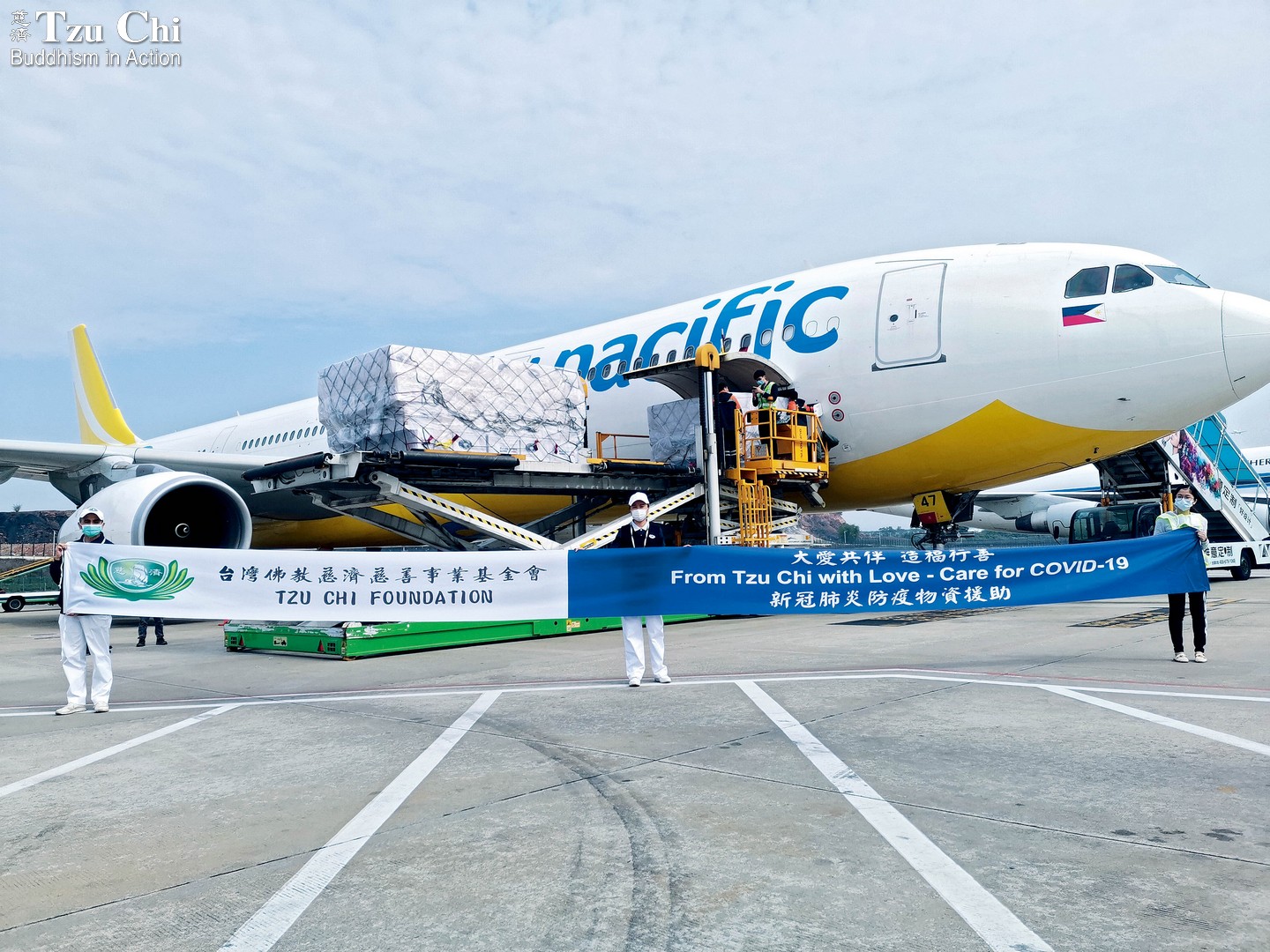
A chartered jet from the Philippines arrived at Guangzhou, China, in late April 2020 to bring back personal protective equipment donated by Tzu Chi. The PPE was to protect frontline medical workers in the Philippines. Li Hong-li
Getting the aid out
The coronavirus was first detected in China near the end of 2019, and until February 2020, most of the infections were concentrated there. The highly infectious disease made medical masks a daily necessity in areas hit hard by the virus. Demand soon outran supply in China, and even those with money couldn’t obtain masks. A shortage of masks occurred in Taiwan too, especially after the first coronavirus case was diagnosed on the island on January 21, 2020. The Taiwanese government responded to the shortage by banning the export of medical masks, taking control of and ramping up domestic mask production, and establishing a rationing system.
Because of the government’s ban on exporting medical masks, Tzu Chi Taiwan couldn’t send any medical masks abroad to help those in harder-hit areas. Instead, Tzu Chi volunteers in Indonesia, America, and other places took it upon themselves to purchase medical masks, protective clothing, disinfectant alcohol, and other essential items in their countries and send the supplies to China.
By April, domestic transmissions in China had largely been brought under control, and the country’s ability to produce anti-coronavirus medical supplies began to increase. At the same time, Europe, the Americas, and Southeast Asia were seeing a surge in infections and a spike in demand for protective gear. The flow of medical supplies was thus reversed—from China to other countries.
Tzu Chi volunteers in Guangzhou, the capital of Guangdong Province and the largest city in southern China, formed a team to purchase medical supplies in China for the foundation’s global COVID aid project. Tang Weiliang (唐惟良), a Tzu Chi staffer on that team, recalled that hectic period when they had to work like mad to obtain PPE to send to heavily impacted countries. The pandemic had already severely strained the global supply of PPE, making the purchase of protective gear a real challenge. When he wasn’t on the phone looking for suppliers, he was getting ready to make another call. Though the team was in Guangzhou, the suppliers they found were not confined to that city or even Guangdong Province—some were as far as in the northeast part of China.
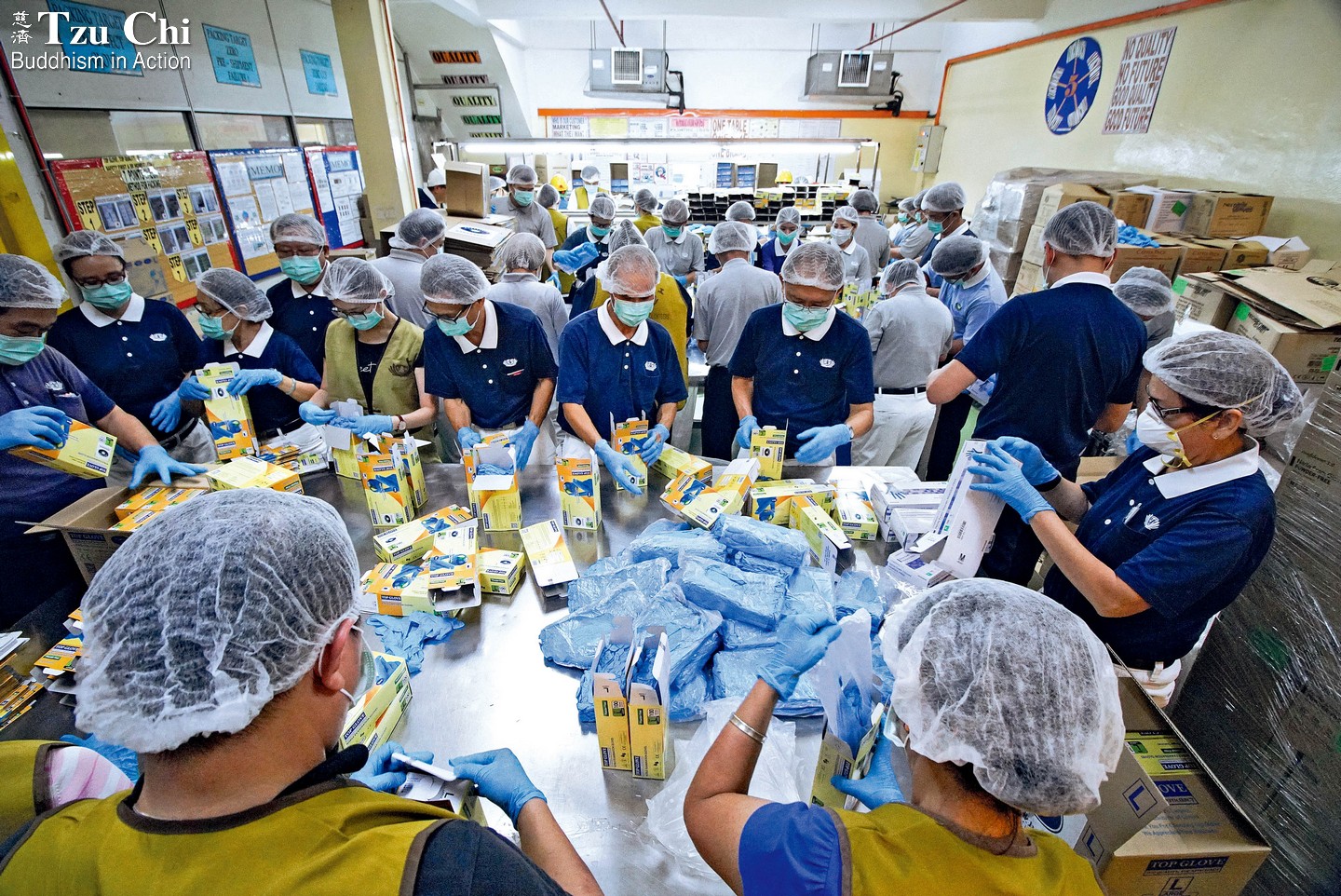
The Tzu Chi Kuala Lumpur and Selangor branch in Malaysia purchased 6,000,000 medical gloves in February 2020 to send to Wuhan, the city in China where the novel coronavirus started. Tzu Chi volunteers worked 500 shifts to help the manufacturer package the gloves so that the goods could be sent out sooner. Dai Hui Da
Tang’s team was not the only one mobilized for the purchasing project. “We relied a lot on the volunteers spread across China to pull off our mission,” said Tang. “They visited manufacturers in their cities to carry out on-site inspections, talked things over with the manufacturers, and checked out the quality of the goods we had ordered.”
Volunteers had to work hard to obtain much needed medical supplies, but that was only half the battle. Once the goods had been procured, getting them out was another challenge. Flights leaving China for other countries had been sharply reduced due to pandemic-related border closures. Volunteer Zhang Ling (張玲) said that one of the things she was most afraid of hearing during that time was that “there were no available flights or cabin spaces [for them to book to send out the supplies].”
Even when flights were available, there was no guarantee that medical supplies could be loaded on board in time to be flown out. China’s customs policies on the export of medical supplies were changed several times after the outbreak of the coronavirus to tighten the control and inspection of medical goods leaving China. Goods waiting for inspection and clearance were backed up due to the tighter controls; it was taking things forever to get through customs. As a result, it sometimes happened that a shipment of goods prepared by the volunteers missed the flight they had booked.
In addition to air freight, maritime transport was another way to get the goods out. On the evening of May 7, 2020, a hundred ventilators purchased by Tzu Chi were being loaded into a shipping container to be delivered to Indonesia. But due to lack of experience, the volunteers taking care of the shipment found to their dismay that the shipping container was only large enough to hold 84 ventilators. This was a real dilemma; the volunteers had already filed the customs declaration for the shipment, indicating the container contained a hundred units. A hundred ventilators had to be loaded into the designated shipping container, no more nor less.
“We had no other way out that night,” said volunteer Fu Jinhua (傅金花). “I was so anxious I was on the verge of tears.” She tried to calm herself down and worked with other volunteers to solve the problem. After making careful measurements, they decided to remove the shipping pallets on which the ventilators were stacked and reload everything into the container. But that presented another problem: without the pallets, it would be impossible to use a forklift to reload them. The volunteers ended up having to move the ventilators back into the container by hand. It was no easy task, as each ventilator weighed 40 kilograms (88 pounds). Fortunately, they finished everything in time for the container—containing exactly a hundred ventilators, no more nor less—to be shipped.
Though challenges like these were numerous during Tzu Chi’s COVID aid project, volunteers and staffers managed to overcome them, one by one. They did their best knowing they were taking part in a meaningful and significant mission, a mission that would save lives.
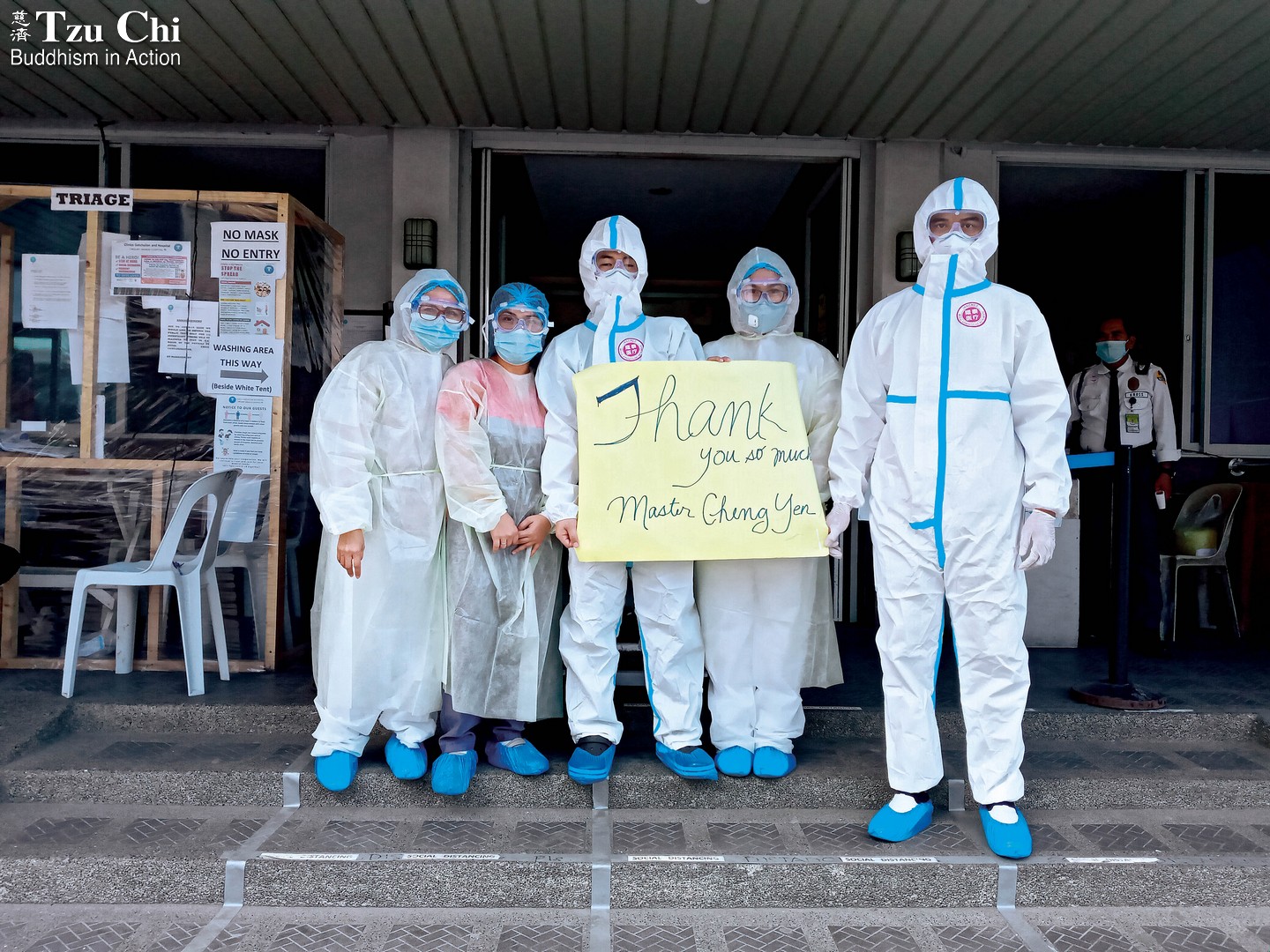
Medical workers at Clinica Gatchalian Hospital in Ormoc, in the province of Leyte, the Philippines, pose with a hand-written sign to thank Dharma Master Cheng Yen for donating medical masks, isolation gowns, and other personal protective equipment to the hospital. Belen Velasque
5000 kilometers of benevolence
“At the end of January [2020], we at Tzu Chi Indonesia purchased anti-coronavirus supplies and sent them to China,” said Liu Su-mei (劉素美), CEO of Tzu Chi Indonesia. “We also sent some masks to Taiwan.” But when the COVID-19 situation took a turn in March and infections started to rise in Indonesia, “we immediately purchased large amounts of medical supplies [from China] to help protect domestic healthcare workers. As soon as the COVID-19 test kits we had purchased arrived, Indonesia’s Minister of Health personally visited our office in Jakarta to receive some of them [for distribution to medical facilities in the nation].”
Almost all medical institutions around the world at that time were facing a shortage of PPE. Some doctors and nurses resorted to wearing raincoats or plastic bags to protect themselves from the virus. “I was thrilled and proud [to be a member of Tzu Chi] when I learned from our volunteer group chat that Tzu Chi and businesspeople in Indonesia were working together to raise a billion NT dollars [US$33,550,400] to buy protective gear to safeguard healthcare professionals in Indonesia,” said volunteer Wang Hui-jiao (王惠嬌) in that nation. More than a hundred companies contributed to the fundraising campaign in the end, enabling it to reach its goal in a short time. Wang said that the success of the campaign showed how much the participating entrepreneurs trusted Tzu Chi.
The Indonesian government imposed large-scale social restrictions to stem the virus on April 10, 2020. Soon thereafter, volunteers began to notice how the precautionary measures were impacting the local economy and pushing low-income families deeper into poverty. In response, volunteers decided to distribute boxes of daily necessities to the underprivileged to help them weather the crisis. Based on local income levels, volunteers established that each box of necessities was valued at 8.30 U.S. dollars and invited everyone to chip in to help out. Even people of modest means could contribute by sharing the cost of a box of goods.
Indonesia’s anti-coronavirus aid mission covered more than 5,000 kilometers (3,106 miles)—from Aceh, the westernmost province, to Papua, the nation’s easternmost province. By early December 2020, the mission had benefited 1,404 medical facilities and other organizations and more than 424,000 needy families.
“When our donors saw Tzu Chi donating anti-coronavirus supplies to hospitals and daily necessities to the needy,” Wang said cheerfully, “they knew they had made the right decision to donate to our foundation.”
The large-scale aid project organized by Tzu Chi Indonesia attracted a lot of attention. For example, Birgaldo Sinaga, a Christian internet celebrity in Indonesia, donated 165 U.S. dollars to the foundation to help with the COVID project. One hundred sixty-five U.S. dollars is not a small sum in Indonesia. He has a fan base of 200,000, and he posted his receipt for the donation on his social media platform afterwards. This generated a lot of buzz. Sinaga also posted Tzu Chi donation receipts from his fans to encourage more people to join in and donate to the cause.
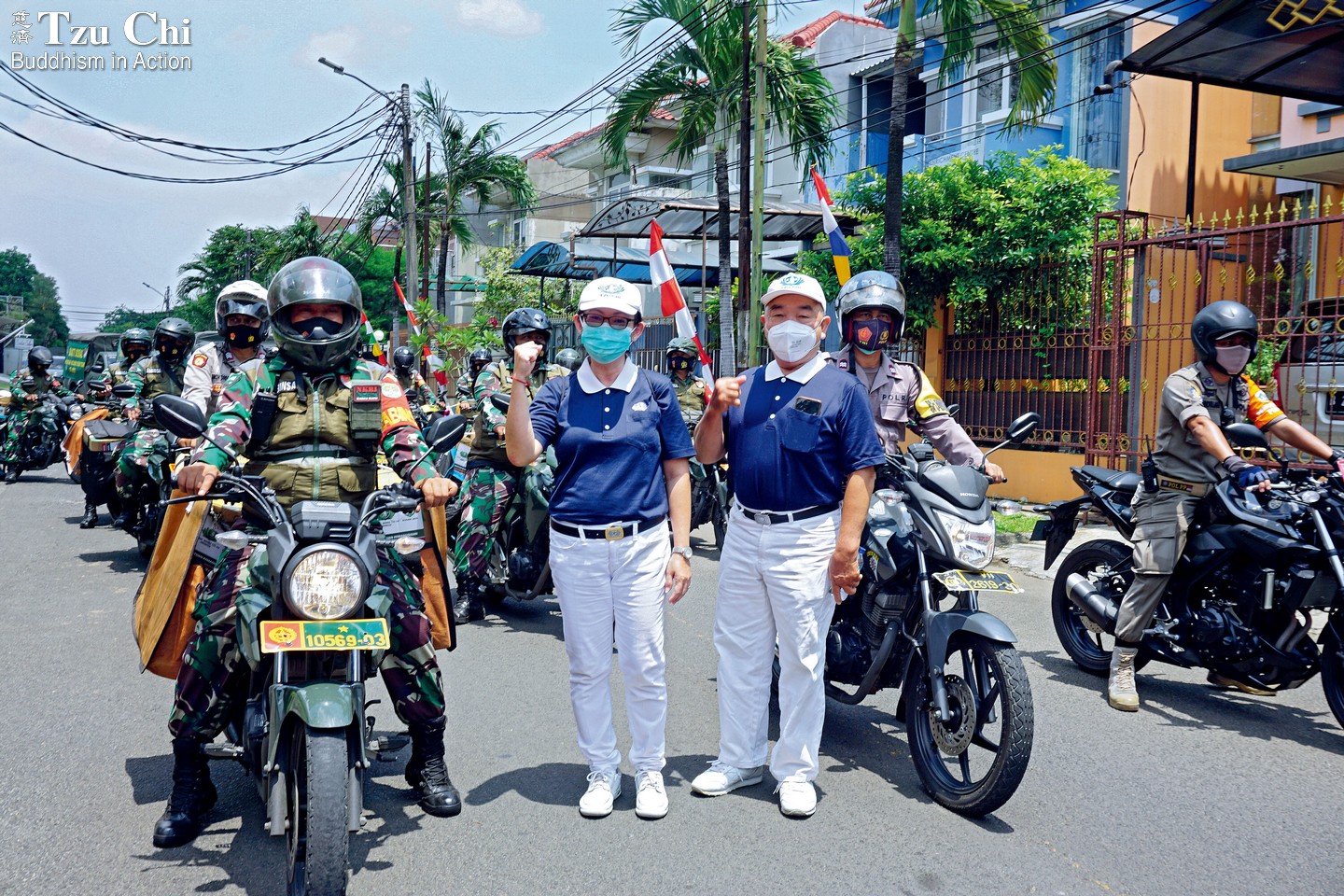
Indonesian military personnel get ready to set off from a military facility in Semanan, Kalideres, West Jakarta, in late September 2020 to deliver Tzu Chi-supplied daily necessities to needy families. Like in other countries, movement restrictions have hurt the economy and killed jobs in Indonesia. Tzu Chi Indonesia started a relief plan to help tide the underserved over the pandemic. Khusnul Khotimah
Stepping up to the plate
The Philippines was also hit hard by the pandemic. The Philippine government implemented a lockdown in mid-March 2020, pushing the lives of impoverished people even closer to the edge. According to Henry Yunez (楊國英), CEO of Tzu Chi Philippines: “The government recognized that people needed help during this time and distributed aid accordingly, but the money and goods were only enough to last each recipient family a few days. Many people didn’t receive any aid at all.”
Tzu Chi volunteers deeply sympathized with the plight of the people struggling to get by, and decided to distribute rice to prevent them from going hungry. But giving out rice was easier said than done during a time like the pandemic. The lockdown had brought many business activities to a standstill, making it difficult for volunteers to purchase the massive amount of rice needed for the distribution. It was also a challenge to find people to drive the trucks enlisted by Tzu Chi to transport the rice. Volunteers made countless phone calls day and night before eventually solving the supply and transportation problems.
An even greater challenge was that the government had forbidden citizens over 60 from leaving their homes as part of the COVID-19 travel restrictions. This was to protect people in that age bracket, considered high-risk, from coronavirus infection. Though well-intentioned, the order compounded the difficulty of Tzu Chi’s rice distribution project because many experienced Tzu Chi volunteers were in that age bracket.
Fortunately, volunteers in the Philippines had, by dint of decades of work in the nation, inspired many young and middle-aged people to join their ranks to serve the needy. When these younger volunteers learned how the government order had added to the difficulty of the distribution project, they stepped up to the plate and said they’d do their best to help.
Volunteers subsequently launched the distributions with the help of the military, the police, and barangay leaders. (A barangay is the smallest administrative division in the Philippines.) Each distribution was limited to a maximum of 2,000 families. People who worked the events were required to wear masks and gloves on-site. Marks were made on the ground at regular intervals for social distancing.
The first distribution took place in Tatalon, a barangay in Quezon City. As the event progressed, the crowd grew larger and larger, eventually making social distancing impossible. After inquiry, it was discovered that some in the crowd were from other communities and not on the recipient rosters for the distribution that day.
“We can’t go on like this,” the barangay leader said to Tzu Chi volunteers. “We’re breaking the rules.” Volunteers responded by calling a halt to the event. They asked those who were not on the rosters to go home and wait for the distributions that would be held in their communities later. When the crowd thinned out a bit, the event was able to proceed.
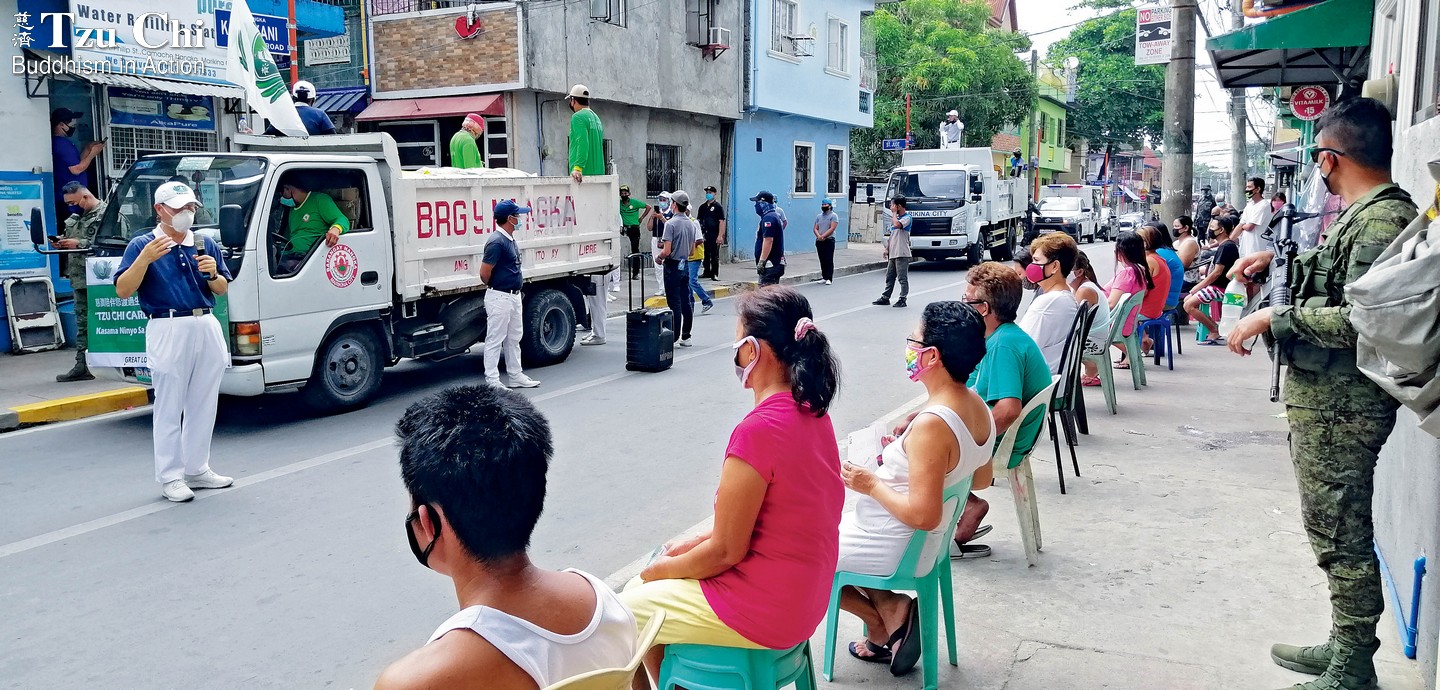
Tzu Chi volunteers in the Philippines distributed rice to residents of Marikina in mid-April 2020. Participants wore masks and observed social distance to decrease the chance of spreading the virus. Courtesy of Tzu Chi Philippines
Volunteer Zhuang Li-yuan (莊黎媛) said that the purpose of the distributions was to help people through the pandemic and bring a sense of stability to their disrupted lives. If order could not be maintained at an event and rules not followed, the distributions, instead of helping, might exacerbate infection rates in communities and make things worse. Thankfully, people at following distributions generally followed volunteers’ guidance, stuck to the circulation routes set up on-site, and observed social distance regulations the best they could. Everyone’s cooperation made it a lot easier for volunteers to pull off the events.
Another distribution was held in the barangay of Pulpogan, in Cebu. The community had a high crime rate and was referred to as a “black area” by locals. Volunteer Hong Li-qiong (洪麗瓊) explained: “Most residents there work as wharf laborers or tricycle drivers. Their incomes are minimal. The pandemic must have presented a real challenge to them.”
Confirmed infections in Pulpogan prompted the government to establish tight controls on people entering and leaving the district. Therefore, local volunteers and students receiving tuition aid from Tzu Chi were put in charge of conducting the distribution. Volunteers had worked in the area for five years, and though the students were young, residents looked upon them as Tzu Chi representatives and so showed regard for them during the distribution. The students did a good job, impressing Hong, who called them the potential new blood of Tzu Chi. The two-day event, which took place in early May 2020, ran smoothly. More than 3,300 impoverished households benefited.
Just a stretch of sea away from Cebu is Bohol, where volunteers focused their aid mainly on underprivileged people who hadn’t received government aid. Bags of rice, each weighing 25 kilograms (55 pounds), were transported to the main island of Bohol, and some were then further ferried to smaller outlying islands. “We launched a distribution there without expecting how much we would be able to achieve,” volunteer James Chua (蔡青山) said. “Who could have predicted that our aid would end up reaching all 47 villages in Bohol!”
The Philippines were hit by a series of major natural disasters in 2019, followed by a volcanic eruption near Manila in January 2020. Then the pandemic broke out. Tzu Chi volunteers in the nation worked ceaselessly to raise donations to help those impacted by these events, but by the time they decided to launch the rice distribution for people impacted by COVID-19, they only had enough money left to help 60,000 families. “When Master Cheng Yen learned of our situation,” said CEO Henry Yunez, “she instructed us not to let the lack of money hinder our efforts. She said that our headquarters in Taiwan would support us. That was really a big shot in the arms for us.”
With the help of volunteers in Taiwan and from around the world, Tzu Chi Philippines was able to expand the scale of their aid project. Even remote islands at the southernmost end of the nation, where Muslim populations were dominant, received rice from Tzu Chi transported all the way from Manila. By the end of October 2020, Tzu Chi had distributed 143,000 bags of rice in the Philippines, benefiting over 130,000 families.
No time to lose
The Americas and Europe have experienced some of the worst outbreaks of COVID-19 in the world. Volunteers there first made cloth masks and gave them away to help protect the health of local community residents. Then, when Tzu Chi-supplied medical items such as protective clothing, ventilators, and surgical masks were delivered, volunteers collected the shipments at airports and quickly arranged to have them rushed to hospitals and nursing facilities. Each delivery was like a race against the Grim Reaper.
Xie Zhen-xiang (謝禎祥), a Tzu Chi volunteer in Bolivia, South America, arrived at an international airport in Santa Cruz, the largest city in Bolivia, on May 13, 2020, to collect a shipment of anti-coronavirus supplies. Reporters from news outlets were on-site to cover the story. The arrival of the medical supplies and equipment donated by Tzu Chi was a rare piece of uplifting news in the nation since the coronavirus had hit there two months earlier.
The shipment of supplies was immediately sent to five hospitals. Some of the supplies arrived at one of the hospitals at midnight, not a moment too soon for some patients. A very sick, elderly woman was sitting in a wheelchair, a medical device next to her indicating that her blood oxygen saturation level was below 80 percent, dangerously low. She was quickly connected to one of the ventilators donated by Tzu Chi. “Within 30 minutes, her oxygen level had risen to above 90 percent,” said volunteer Xie Zhen-xiang. “We saved her life!”
Xie thanked Master Cheng Yen and Tzu Chi volunteers around the world for helping save lives in Bolivia.
Medical supplies and equipment can help save lives, but food and other daily necessities are just as important for families struggling to survive the economic hard times triggered by the pandemic.
Nearly half of the residents of Wilmington, a neighborhood in Los Angeles, California, are first generation immigrants from Latin America. Low-income households comprise one fourth of the families in that area. Tzu Chi has worked with local Catholic churches and community shelters to distribute essential supplies to underserved people there on a regular basis since 1998. The service continued even during the pandemic.
One such distribution was held on June 20, 2020, with precautionary measures duly taken. During the event, Maria Maderna, a Wilmington resident, shared with Tzu Chi volunteers some text messages she had received. The messages were from her landlord demanding outstanding rental payments. Maderna’s husband had died of leukemia, and she was raising three children alone. Adding insult to injury, she was also diagnosed with breast cancer. Even though the government had banned the eviction of tenants for unpaid rent during the COVID-19 pandemic, Maderna was still finding it hard to get by. She had no choice but to come to the distribution to pick up food.
Unable to pay rent, no money to buy food—examples like Maderna’s abounded in the Wilmington community. Even so, some needy people there still did what they could to help others; they knew there were people worse off than they were. Gloria Barraco brought two full coin banks to the distribution to donate to Tzu Chi. She and her sisters had been receiving daily necessities from the foundation for years, and were paying forward the love they had received by donating to Tzu Chi to help other needy people. Though what they could donate wasn’t much, their kind gesture was particularly uplifting during the challenging time of the pandemic.
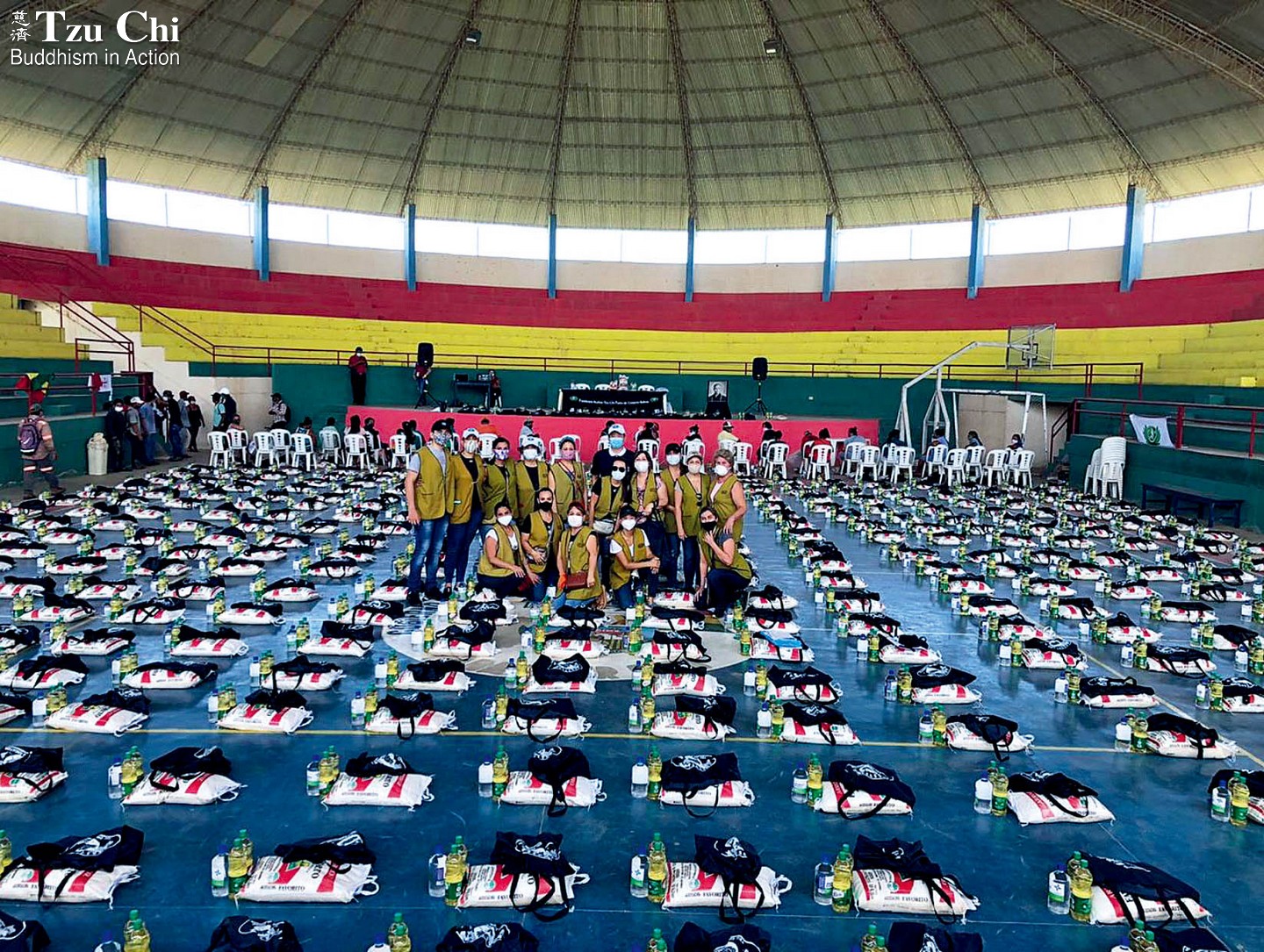
Tzu Chi volunteers in Bolivia conducted a distribution in Montero, Santa Cruz, on September 29, 2020, to help underprivileged families impacted by COVID-19. Each household received 37 kilograms (80 pounds) of supplies. Courtesy of Xie Zhen-xiang and Shi Qian-ru
Bringing hope to the desperate in Africa
Providing aid during the coronavirus pandemic is not an easy undertaking. Tzu Chi volunteers in South Africa have enlisted outside help, including that of many organizations, to allow Tzu Chi’s aid to reach more needy people.
A warm-hearted medical doctor, with the assistance of his friends in the medical field, helped Tzu Chi donate anti-coronavirus supplies to more than 20 large hospitals. Working with over 150 non-government organizations, volunteers completed 250 distributions in the province of Gauteng, benefiting more than 20,000 families. Tzu Chi has cared for 150 visually impaired people in Soweto, near Johannesburg, for more than 20 years. In order to allow Tzu Chi-supplied food to reach these people during the pandemic, Emmanuel Group, a member of the Tzu Chi Collegiate Association, made hundreds of phone calls in two weeks to get hold of them. Even so, he still couldn’t reach them all. It wasn’t until he obtained the help of a local community leader that Tzu Chi was able to get food and other daily necessities to these underserved people.
In Zimbabwe, another country in Africa, the lockdowns imposed to contain the virus interrupted the flow of goods. Prices more than doubled as a result. Tzu Chi volunteers distributed food, blankets, folding beds, and soap to help impoverished people through the crisis. They also drilled wells to help people access clean water.
“Walking long distances to fetch water during the pandemic can pose a serious problem,” said Tino Chu (朱金財), head of Tzu Chi Zimbabwe. When he found out that residents of Domboshava, a village in the province of Mashonaland East, were having difficulty obtaining clean water, he decided to take action to help.
The only serviceable well in the village was located in a cemetery, but even this well didn’t provide much water. To get water clean enough to drink, local women had to leave their homes at three in the morning to fetch water at the well. Since the well didn’t provide much water, if they arrived there too late, the water was too muddy to drink.
Chu found a professional team to drill two wells in Domboshava. Villagers came to help when they learned of the project. Everyone cheered when the drilling machine broke into the earth and water began gushing out. The two wells were completed in five days. Naison Banda, a local resident who attended the inauguration ceremony for the wells, said, “I’m really happy today. Everyone says we need to wash our hands often during the pandemic, but we can’t do that without water!”

An inauguration ceremony was held on June 9, 2020, for two wells Tzu Chi Zimbabwe drilled in Domboshava, Mashonaland East, to help people in the village have easier access to clean water. A steady, easily available supply of clean water is important in a time like the pandemic. Hlengisile Jiyane
●
In December 2020, the United Kingdom became the first Western country to inoculate members of its public against COVID-19 with an authorized vaccine. Vaccinations began in the United States soon thereafter. The good news brought hope to a world reeling from the health and economic impacts of the coronavirus. Let’s all pray for the arrival of the day when the battle against the infection is won. But until that day comes, Tzu Chi volunteers will continue to relieve the plight of needy people and help them ride out the impact from the disease.
Asia and Oceania
The Tzu Chi Foundation has provided anti-coronavirus supplies and other aid, such as food and daily necessities, to 27 countries and regions in Asia and Oceania to help them weather COVID-19. The countries printed in black below received anti-coronavirus supplies, while those highlighted in brown received a combination of anti-coronavirus supplies and other forms of aid:
American Samoa, Australia, Bangladesh, Brunei, Cambodia, China, Hong Kong, India, Indonesia, Iraq, Japan, Jordan, Laos, Lebanon, Malaysia, Myanmar, Nepal, New Zealand, the Philippines, Saipan, Singapore, South Korea, Sri Lanka, Taiwan, Thailand, Turkey, and Vietnam
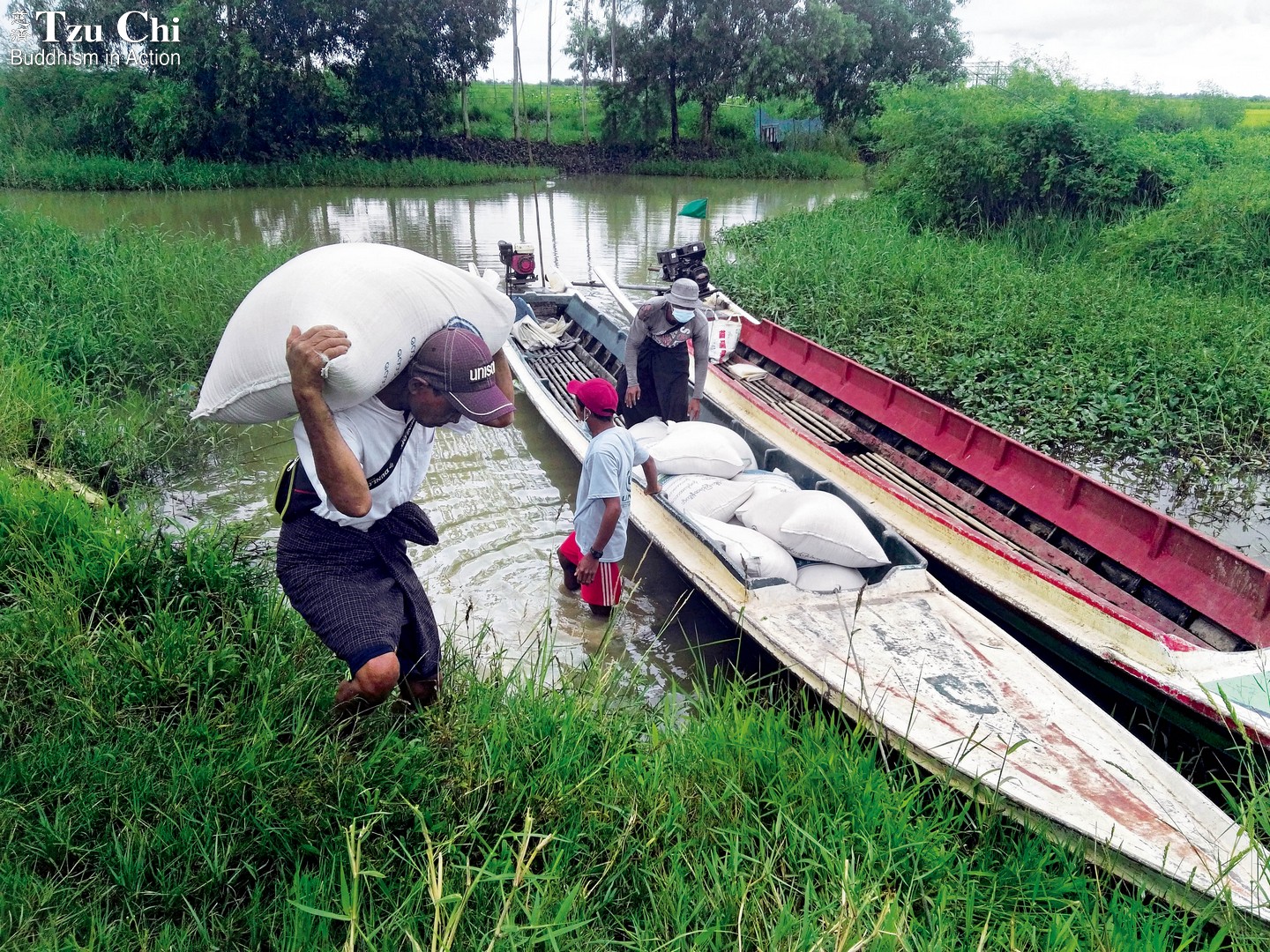
Myanmar
From April to September 2020, Tzu Chi volunteers in Myanmar provided food items to 40,676 farming and underprivileged families to help them ride out the economic challenges posed by the coronavirus. The photo here shows volunteers delivering rice and cooking oil to Kungyangon, a township in Yangon Region, on September 26. Each family received 48 kilograms (106 pounds) of rice and two liters (0.5 gallons) of cooking oil, enough to last each household for a month. Photo by Myo Wai Kyaw
Thailand
On August 20, 2020, Tzu Chi Thailand distributed daily necessities to students who had been affected by COVID-19 in Bang Kruai District, Nonthaburi Province. From April to August, volunteers provided 54,839 underserved families in seven provinces with daily necessities. Tzu Chi Thailand launched a second phase of aid in September, continuing its efforts to help people through this difficult time. Photo by Pinticha Jansuksri
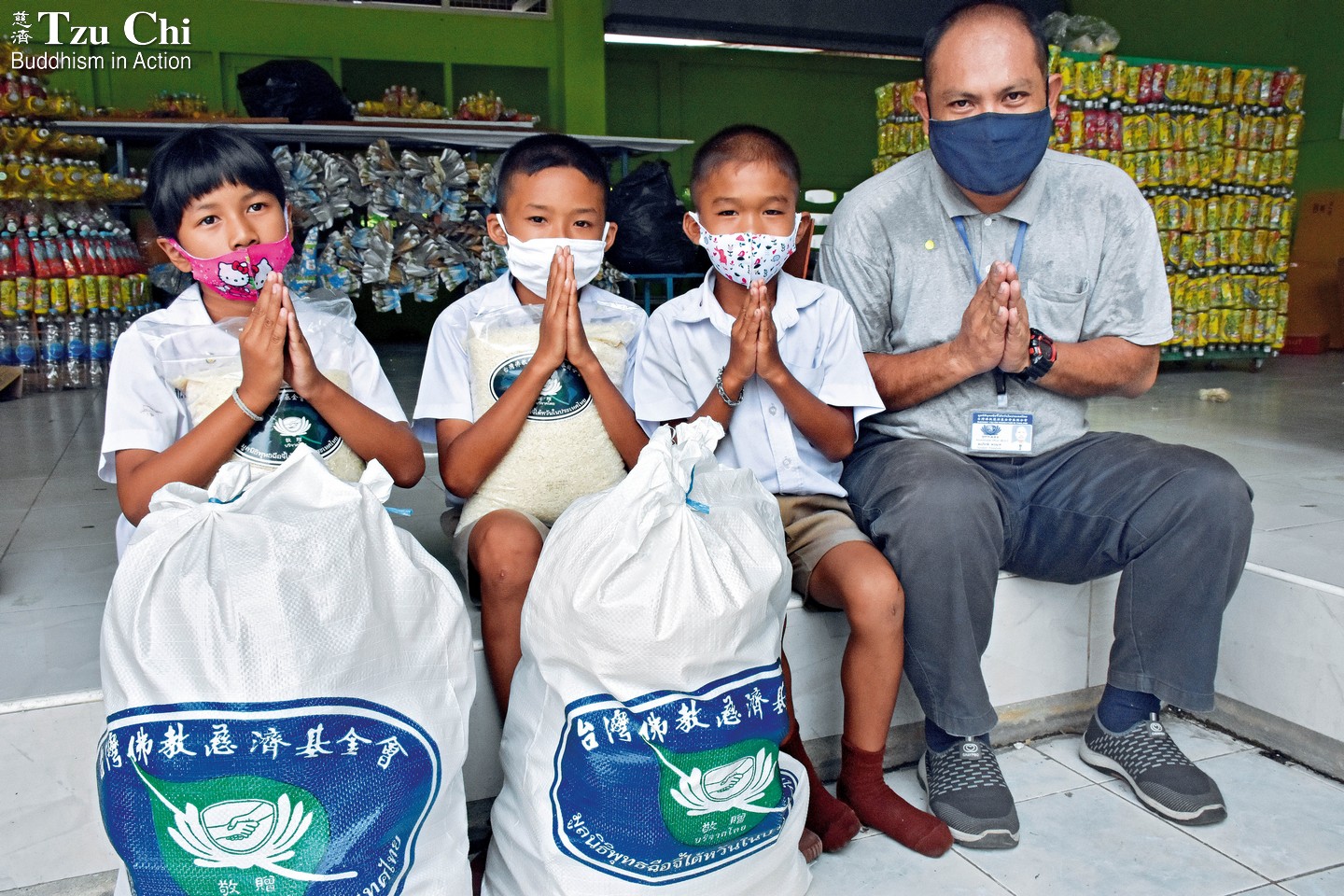
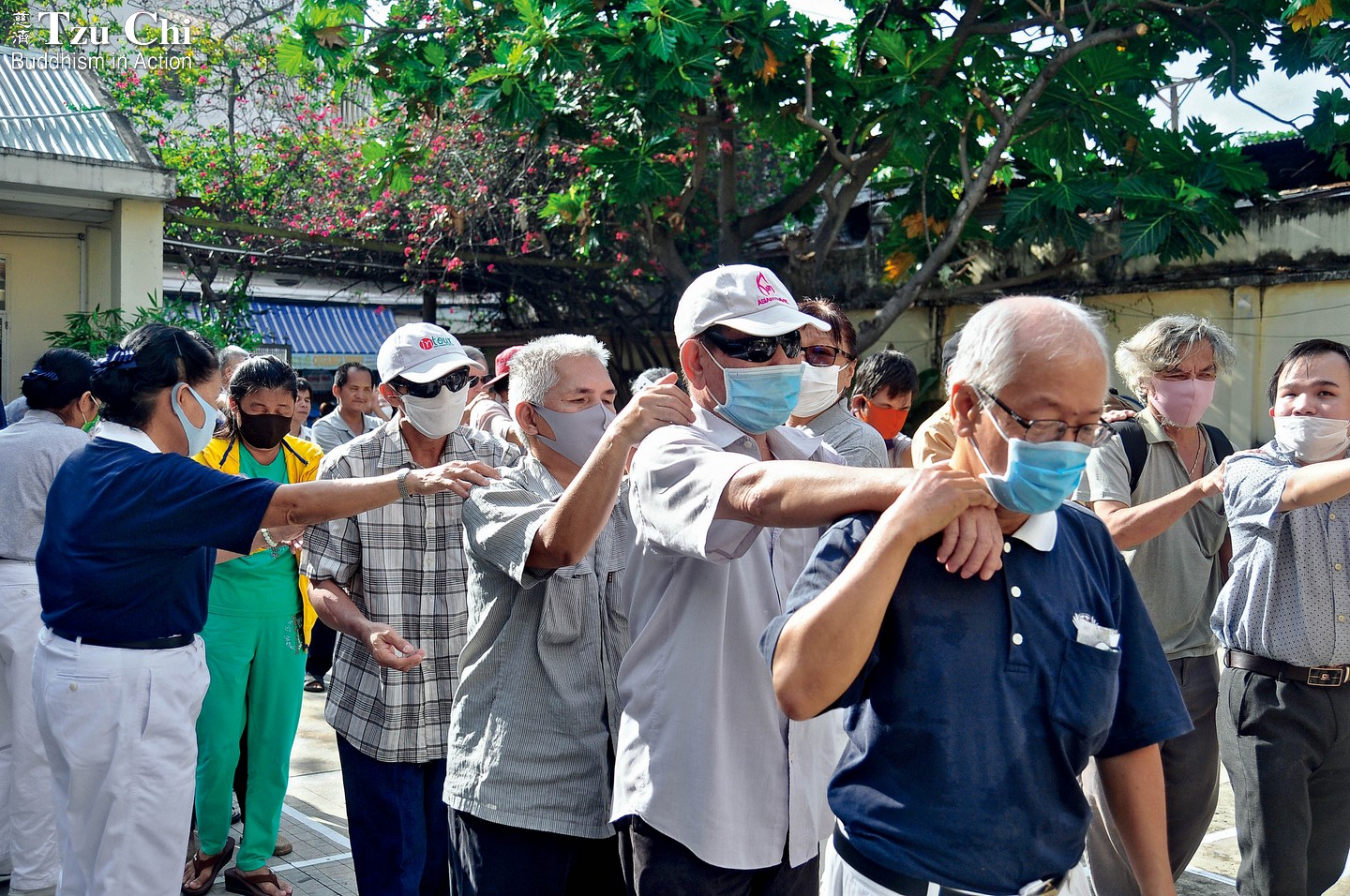
Vietnam
Volunteers guide some unsighted people in District 1 of Ho Chi Minh City to a distribution venue. Tzu Chi Vietnam worked with the Ho Chi Minh City Union of Friendship Organizations to distribute food, cloth masks, and cash (one million dong [US$43] for each recipient) to more than 2,000 people with physical disabilities or visual impairments in May and June 2020. These people generally earn a living by making handicrafts, selling lottery tickets, providing massage services, or singing. The measures implemented by the government to contain COVID-19 had badly hurt their livelihoods. Photo by Wen Tian-liang
Malaysia
Malaysia saw a resurgence in coronavirus infections in October 2020, straining the capacity of hospitals. In response, the government converted a sports center in Sandakan, Sabah, to house low-risk patients. Tzu Chi volunteers helped set up 200 beds there at the request of the Duchess of Kent Hospital. Photo by Kong Teck Ngie
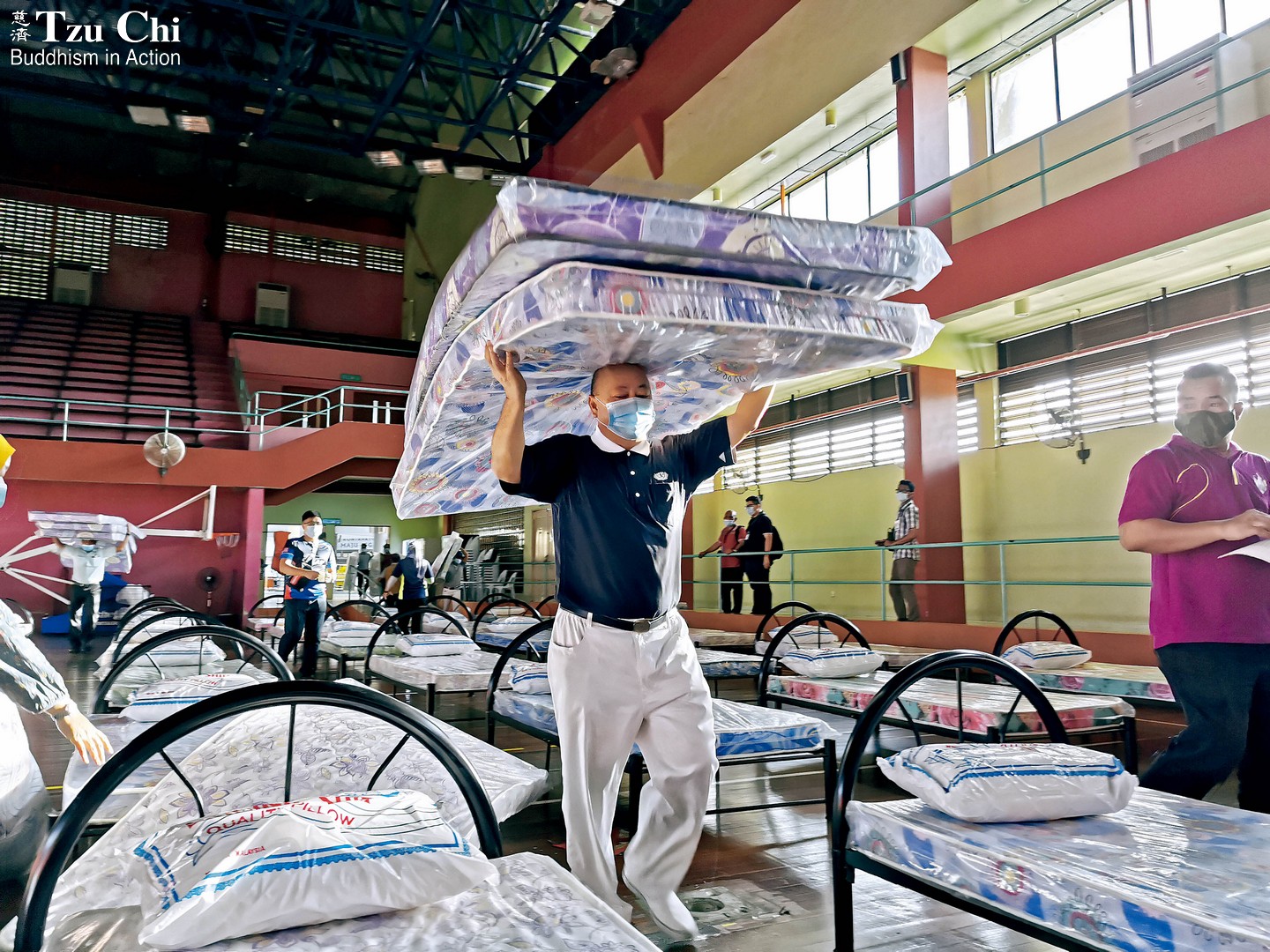
The Americas
The Tzu Chi Foundation has provided anti-coronavirus supplies and other aid, such as food and daily necessities, to 17 countries and regions in the Americas to help people in the areas weather COVID-19. The countries printed in black below received anti-coronavirus supplies, while those highlighted in brown received a combination of anti-coronavirus supplies and other forms of aid:
Argentina, Bolivia, Brazil, Canada, Chile, Dominican Republic, Ecuador, El Salvador, Guatemala, Haiti, Honduras, Mexico, Paraguay, Peru, Puerto Rico, Saint Martin, and the United States
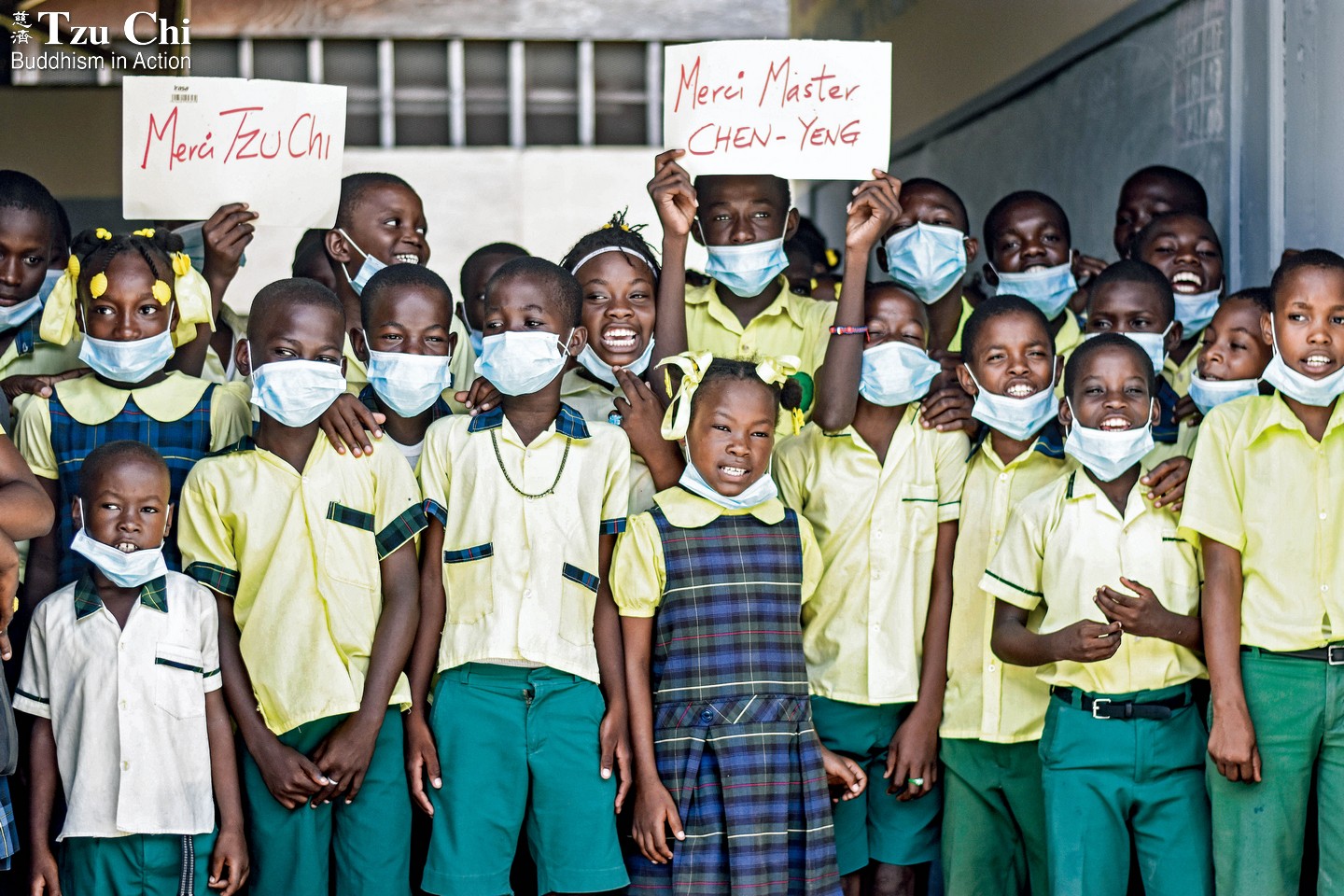
Haiti
A rice distribution was held for more than 1,500 students attending the Little Schools of Father Bohnen (Oeuvre Des Petites Ecoles de Pere Bohnen) in Port-au-Prince on October 1, 2020, the first day of a new semester after a three-month-long summer break. Students held up signs reading “Thank you, Master Cheng Yen” and “Thank you, Tzu Chi” after the distribution. Face masks were also distributed during the event. Photo Courtesy of Tzu Chi USA
Ecuador
Many underprivileged families in Ecuador struggled to get by after COVID-19 related restrictions were put in place. Tzu Chi volunteers carried out large-scale food distributions in Canoa, Portoviejo, Santa Ana, and Manta to help low-income families survive this difficult time. Each family received eight kinds of food, including rice, corn flour, noodles, and cooking oil. Photo courtesy of Tzu Chi Ecuador
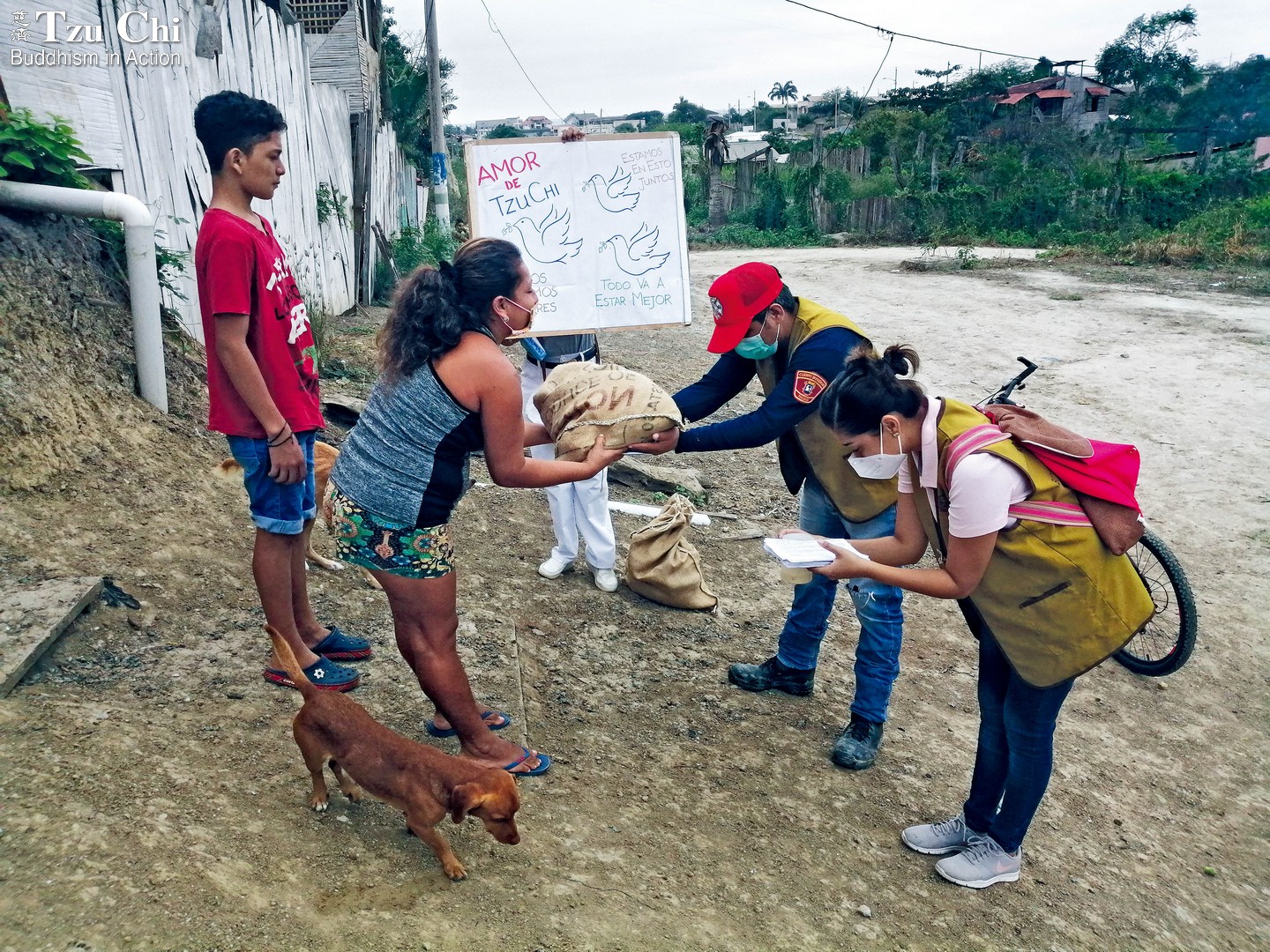
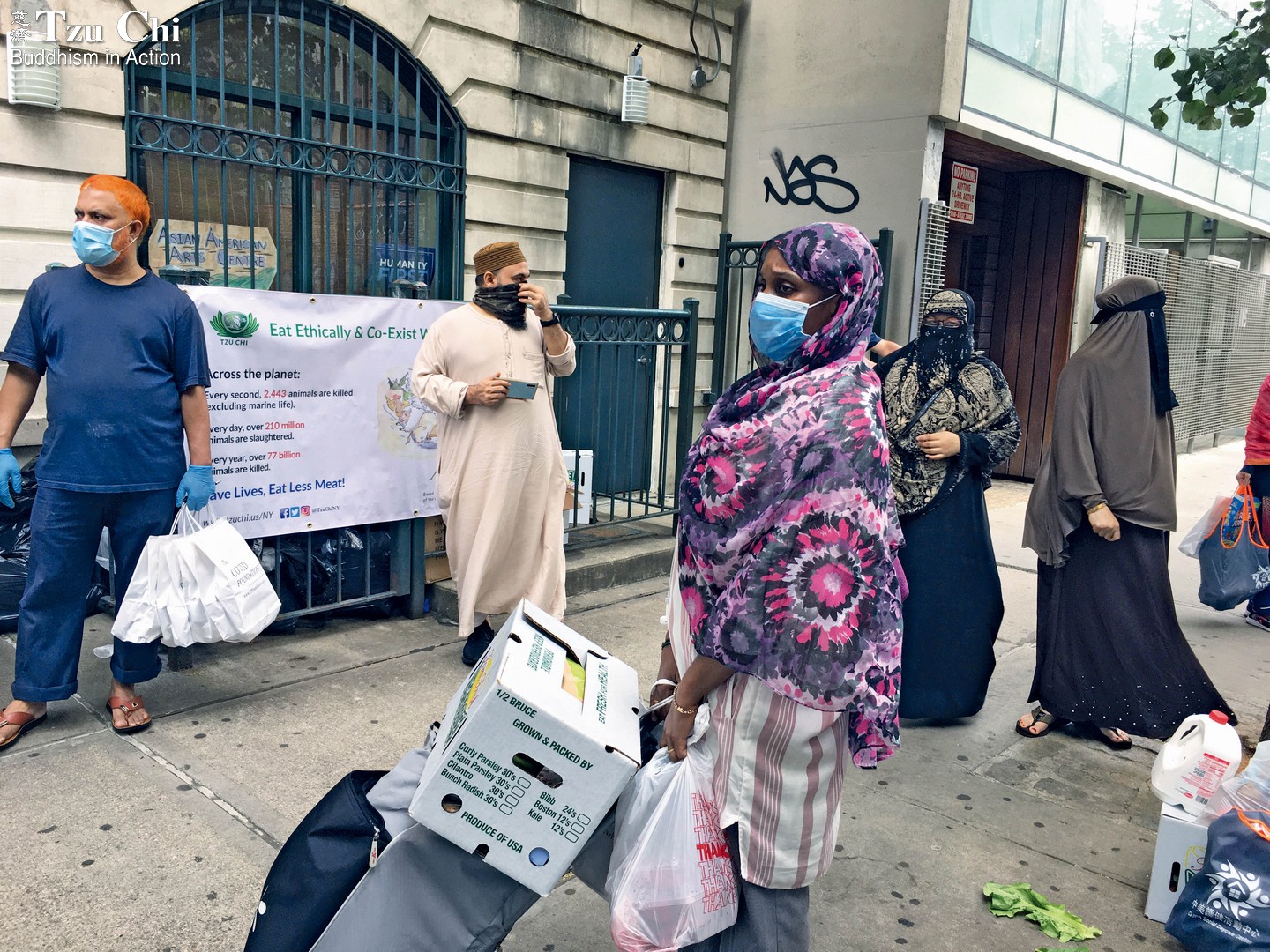
The United States
Poverty and chronic illness are prevalent in the Bangladeshi community in New York City, making them particularly vulnerable to the coronavirus, especially when compared with communities of other Asian immigrants. In May 2020, Tzu Chi volunteers started providing fresh produce and other food items to Bangladeshi immigrants in the city to help increase their nutritional intake and boost their immunity. Photo by Jiang Shan-shan
Paraguay
Despite the pandemic, Tzu Chi volunteers in Ciudad del Este continue to hold monthly distributions for the foundation’s long-term aid recipients. Volunteers work hard to deliver daily necessities to needy households during this challenging time. They’ve even prepared medicine and nutritional supplements for families with sick children. Photo by Silvio Ayala Meira
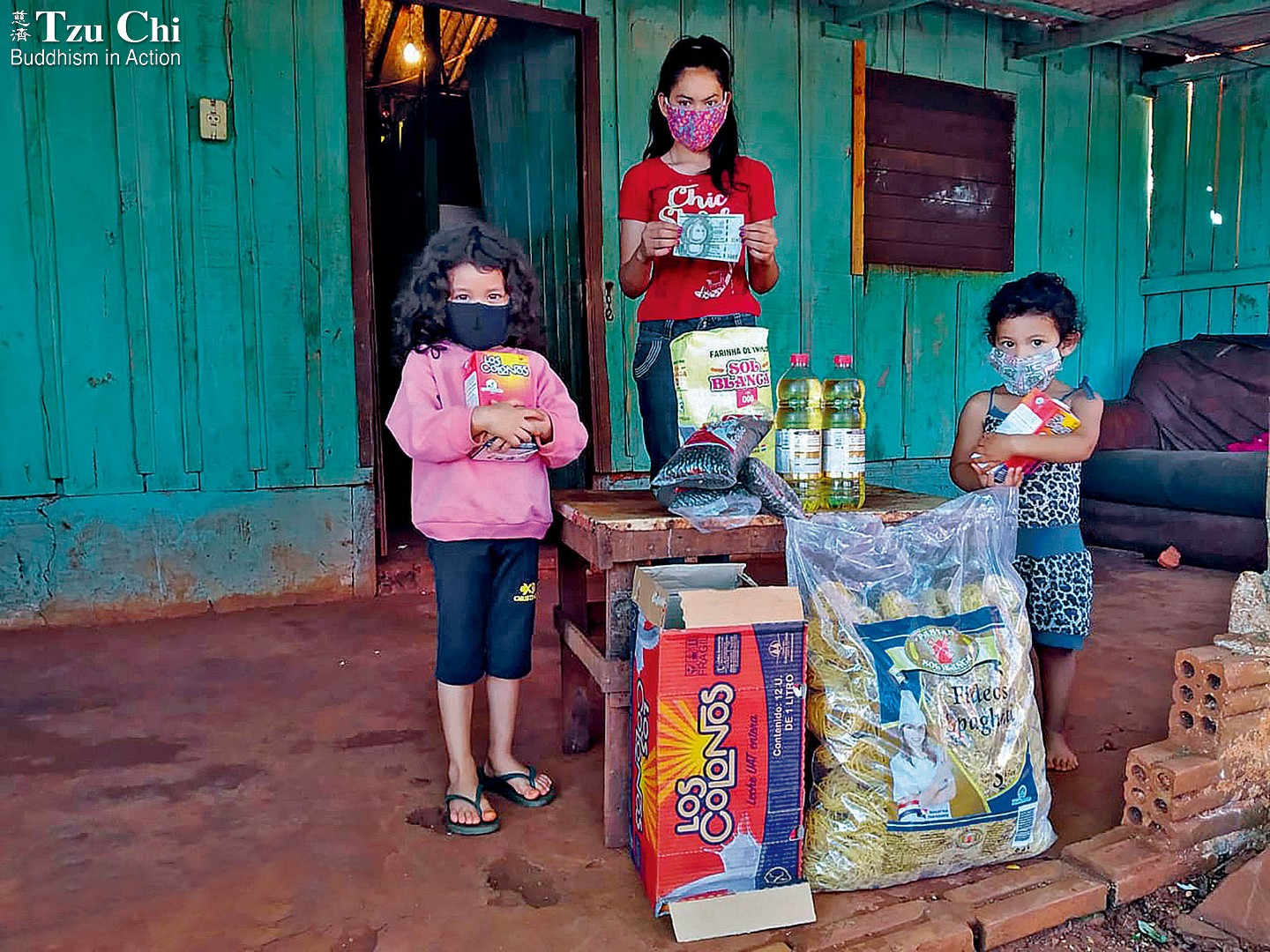
Africa
The Tzu Chi Foundation has provided anti-coronavirus supplies and other aid, such as food and daily necessities, to 23 countries in Africa to help people in the areas weather COVID-19. The countries printed in black below received anti-coronavirus supplies, while those highlighted in brown received a combination of anti-coronavirus supplies and other forms of aid:
Benin, Botswana, Burkina Faso, Congo, Eswatini, Ghana, Kenya, Lesotho, Madagascar, Malawi, Mali, Mauritania, Mozambique, Namibia, Niger, Senegal, Sierra Leone, South Africa, South Sudan, Sudan, Tunisia, Zambia, and Zimbabwe
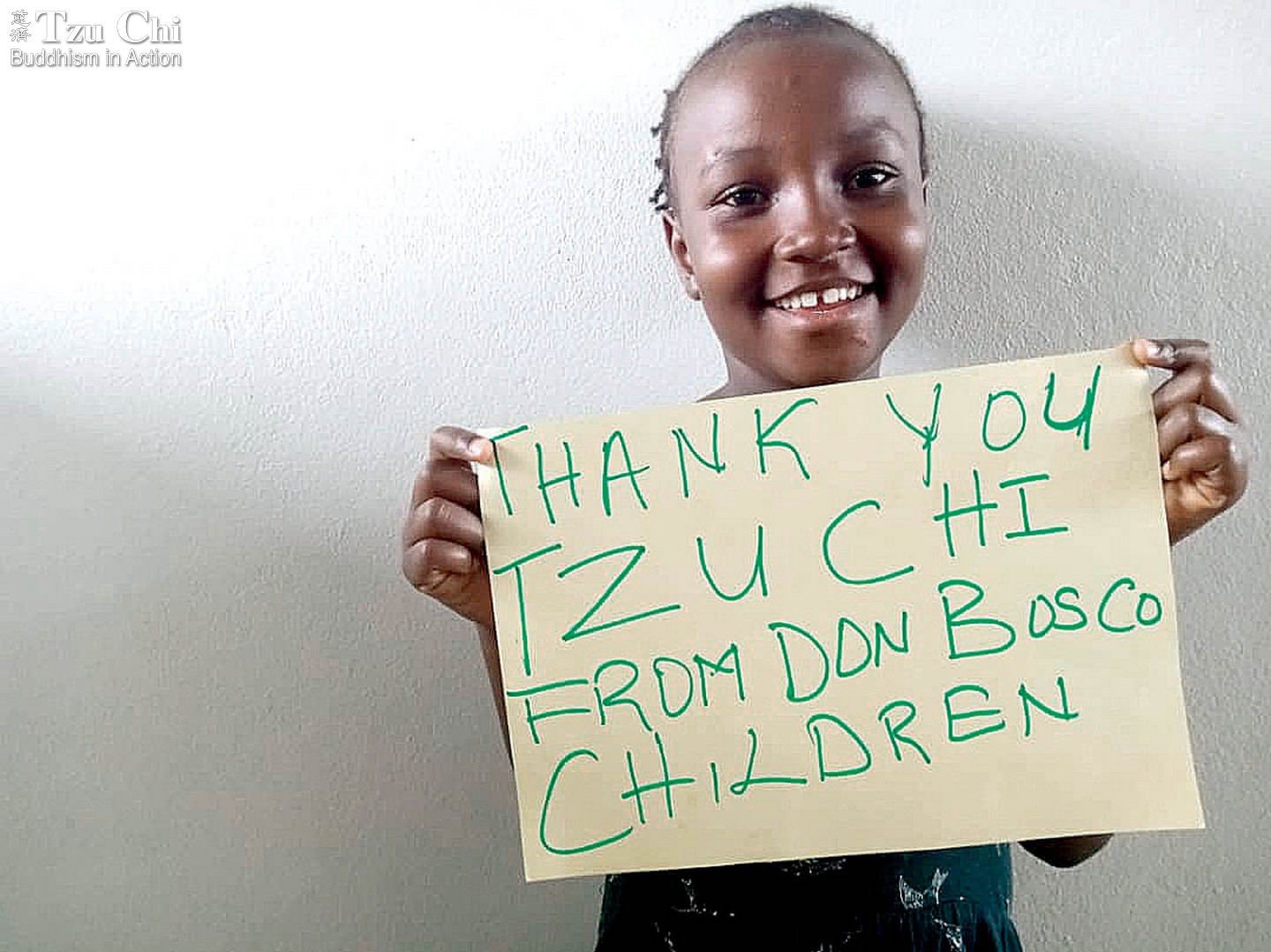
Sierra Leone
Tzu Chi donated personal protective equipment to 20 medical facilities in Sierra Leone to help the country fight the COVID-19 pandemic. The pandemic situation in the nation improved after the first half of 2020, but then flooding ensued as a result of the rainy season. Tzu Chi worked with its partners in Sierra Leone to deliver rice, multigrain powder mix, and buckets for hand-washing to Ebola survivors and social welfare institutions. A girl under the care of Don Bosco Fambul, a non-profit organization in Freetown, is pictured here holding up a message to thank Tzu Chi for donating food to Don Bosco. Photo courtesy of Don Bosco Fambul
Zimbabwe
The Zimbabwe government extended its lockdown measures again in mid-May 2020, making lives more difficult for some impoverished people who didn’t have the ability to stock up on food. Tzu Chi volunteers responded by delivering rice and cooking oil to needy families to prevent them from going hungry. Volunteers also started a hot meal program in Epworth, Harare Province, to serve food to orphans. In addition to food aid, folding beds were donated to people with limited mobility. Photo by Hlengisile Jiyane
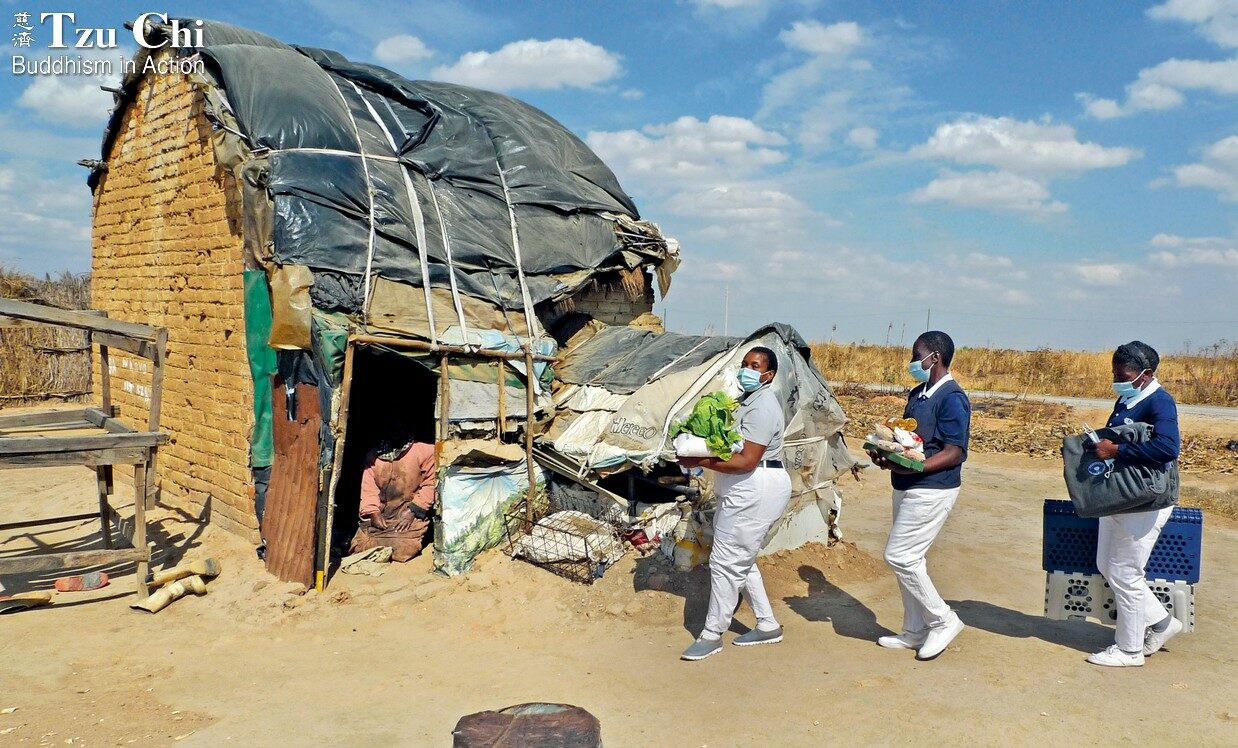
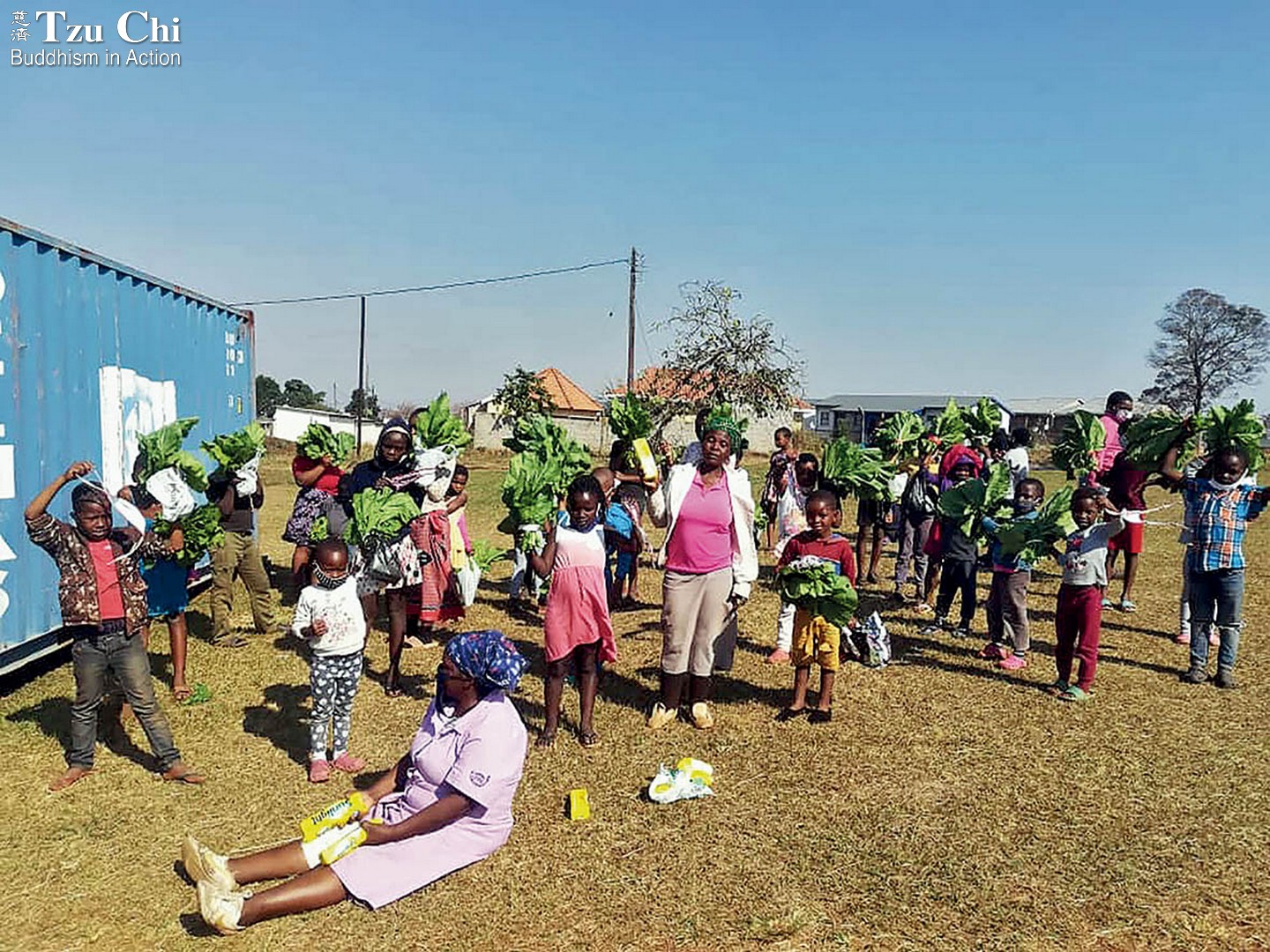
Eswatini
Volunteers in Eswatini cultivate farmland to grow vegetables, and have set up more than 60 hot meal stations to feed local needy people. Meals are provided one to three times a week at the stations. These stations have been especially important during the pandemic, as they help keep hungry children fed. Some stations even give away fresh vegetables. Photo courtesy of Tzu Chi Eswatini
South Africa
South Africa has recorded the highest number of coronavirus infections on the African continent. During July and August 2020, when the pandemic situation was especially severe, Tzu Chi volunteers visited remote countryside areas to distribute food to underserved households. People live far apart in the mountains of Ladysmith, so some aid recipients used donkeys to bring home the rice they received from Tzu Chi. Photo by Huang Qiu-yue
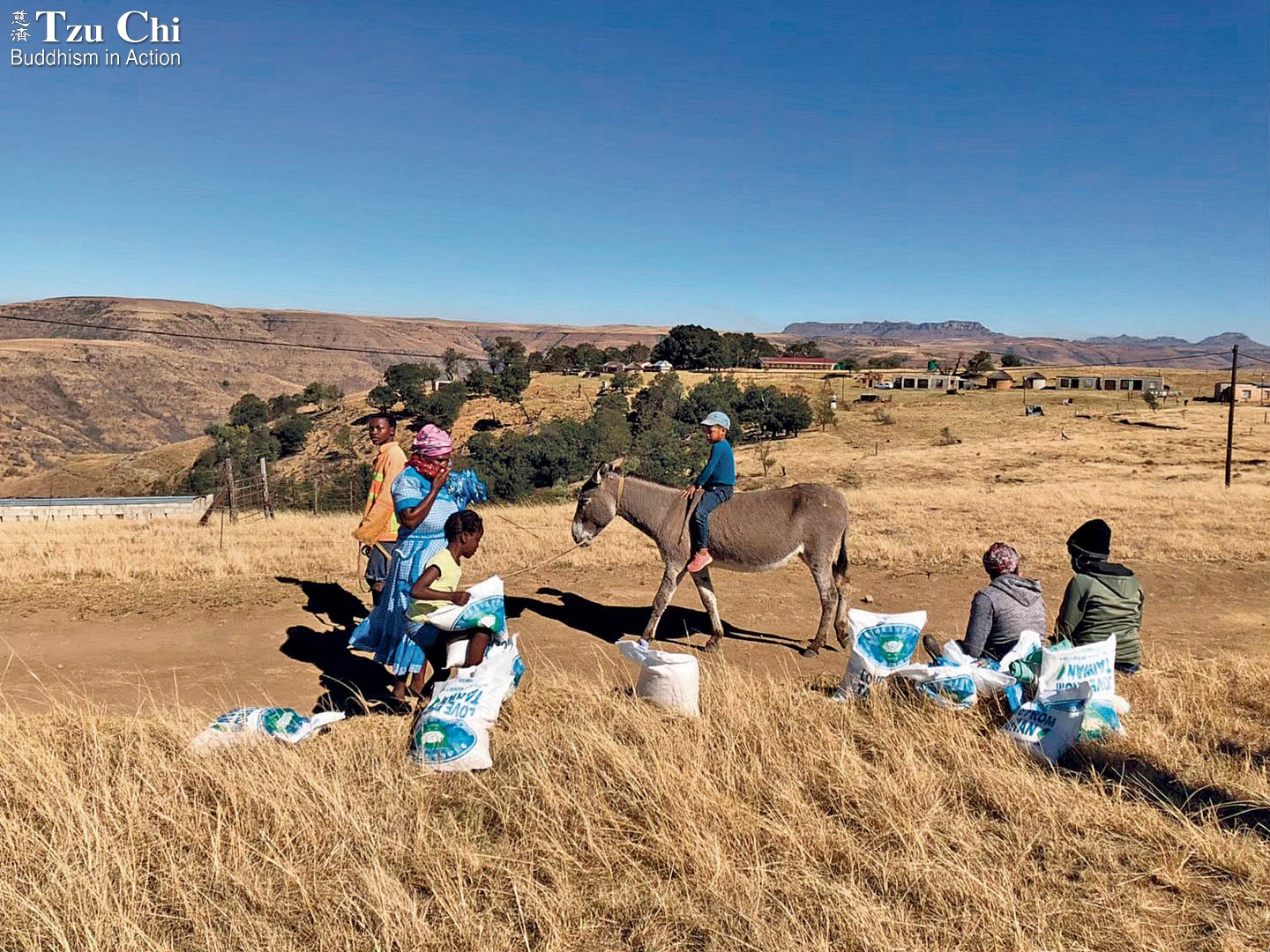
Europe
The Tzu Chi Foundation has provided anti-coronavirus supplies to 20 countries in Europe to help them battle COVID-19:
Albania, Austria, Belgium, Bosnia, Croatia, Denmark, France, Germany, Greece, Italy, the Netherlands, Norway, Portugal, Russia, Spain, Sweden, Switzerland, Ukraine, the United Kingdom, and the Vatican City
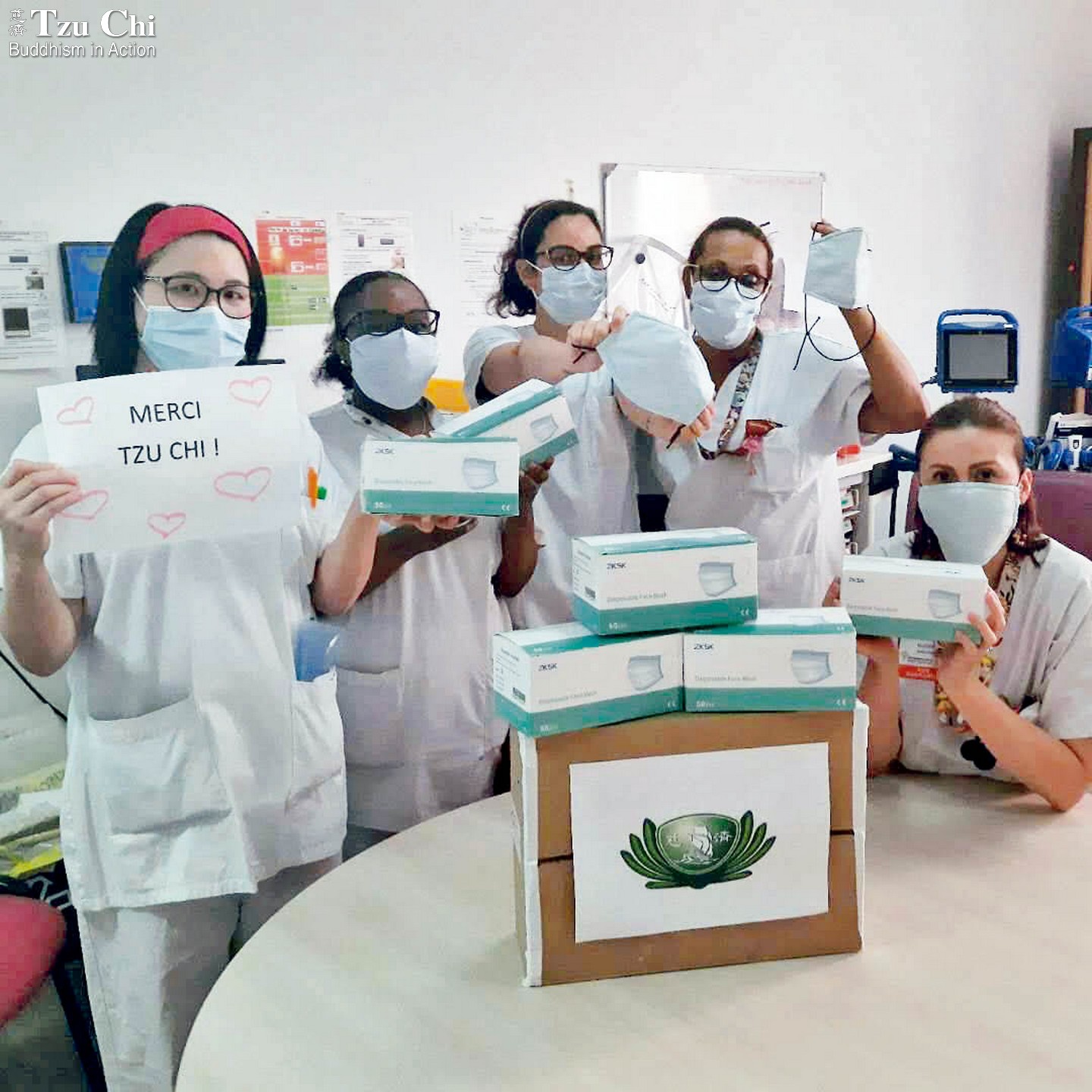
France
Centre Hospitalier Intercommunal Robert-Ballanger, a hospital in Paris, ran short of medical masks during the first wave of COVID-19. When some masks donated by Tzu Chi arrived at the hospital, medical workers took a short break from their busy work to thank the foundation for their donation. Photo by Xu Shu-fang
Italy
Centre Hospitalier Intercommunal Robert-Ballanger, a hospital in Paris, ran short of medical masks during the first wave of COVID-19. When some masks donated by Tzu Chi arrived at the hospital, medical workers took a short break from their busy work to thank the foundation for their donation. Photo courtesy of Tzu Chi Hualien headquarters
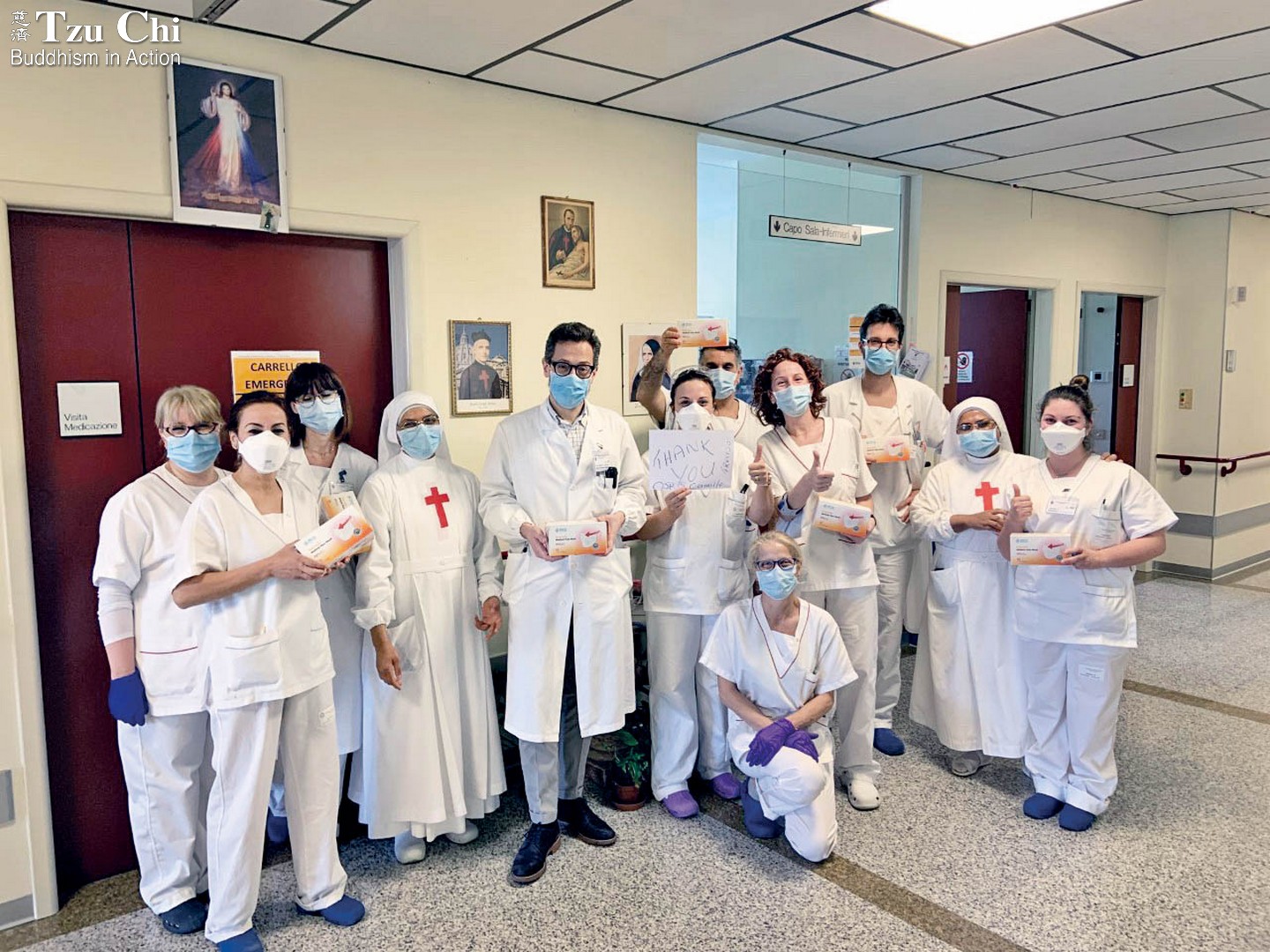
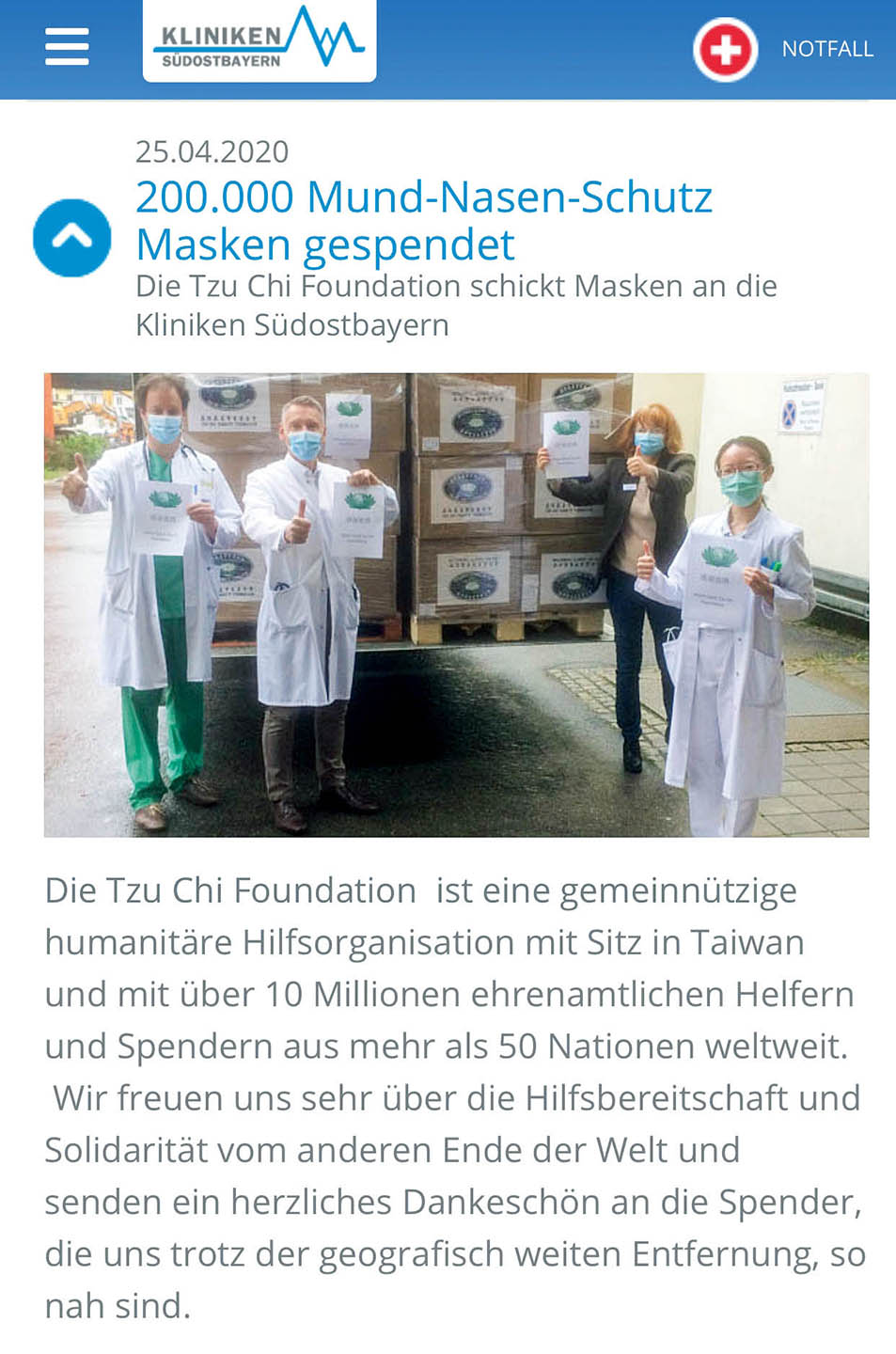
Germany
Eighty thousand medical masks donated by Tzu Chi arrived at Frankfurt Airport in April 2020. They were subsequently delivered to hospitals in Heinsberg, a district in Nordrhein-Westfalen that had been hit hard by the coronavirus. Various hospitals in Bavaria also received 200,000 masks and face shields from Tzu Chi. On their website, Kliniken Südostbayern AG, the “Clinics Southeast Bavaria,” introduced and thanked Tzu Chi for helping their doctors and nurses better equip themselves against the pandemic.
The United Kingdom
Tzu Chi volunteers in the United Kingdom started making and giving away cloth masks in March 2020 to help protect community residents from COVID-19. Volunteers also donated personal protective equipment to 63 medical institutions and 48 social welfare organizations in the UK. This photo shows volunteers delivering gift packs in June to ER and ICU workers in York Hospital in the city of York. Photo by Zhang Xiao-zhen
